- Home
- Ann M. Martin
Mallory Pike No.1 Fan Page 2
Mallory Pike No.1 Fan Read online
Page 2
Like Kristy, Dawn is now part of a blended family. The great part is that her family joined up with the family of her very best friend, Mary Anne Spier, who's also a BSC member.
Things get the tiniest bit complicated here, so let me take a moment to tell you about Mary Anne before I go on with the rest of Dawn's story.
Mary Anne and Kristy used to live next door to one another on Bradford Court. Mary Anne lived alone with her father; her mother had died when Mary Anne was very young. Her father had very rigid ideas about bringing up a daughter. Mary Anne had to obey strict rules about everything from how long she could talk on the phone to what she could wear. (She still wore braids and jumpers in the seventh grade!) Then Mary Anne met Dawn, who had only been in Stoneybrook for four days. They didn't appear to have much in common. Dawn is tall, Mary Anne is short. Dawn is a cool dresser, Mary Anne wasn't. Dawn is outgoing, Mary Anne is shy. But, still, they became good friends pretty quickly.
One day, as they browsed through Mrs. Schafer's old high school yearbook, they discovered something amazing. Mrs. Schafer and Mr. Spier had been boyfriend and girlfriend in high school! Obviously, they hadn't gotten married, at least not to each other. But now they were both free again. Mary Anne and Dawn decided to try to get their parents back together.
It took some doing, but finally everything fell into place. After dating for a long time, Mr. Spier and Mrs. Schafer got married. That's how Dawn and Mary Anne became stepsisters, and Mary Anne and her dad moved into the farmhouse on Burnt Hill Road. At first, it wasn't easy. Everyone - including Mary Anne and Dawn - had a bumpy time learning to work together as a family. But, things slowly started settling down. And, just when everything was finally going smoothly, Dawn decided she missed Jeff and her dad, and went to California to stay with them. Dawn swears she'll be back, but I sometimes wonder. We all really miss her, and hope she doesn't decide to stay in California.
Oh! Talking about Mary Anne reminded me of someone else you should know about: Logan Bruno, Mary Anne's steady boyfriend.
The reason you should know about him is that he's an associate BSC member, like Shannon used to be. We call Logan whenever we have more jobs than we can handle. Logan has curly light brown hair and a Southern accent. His family (which includes his mother and father, a younger sister, and a younger brother) is from Louisville, Kentucky.
Let's see, who haven't I mentioned? Claudia! Claudia Kishi, whose room we were in at that moment, is strikingly beautiful. She has long, silky black hair, and lovely almond-shaped eyes. (She's Japanese-American.) Claudia's natural beauty is set off by her unique fashion sense. You see, Claudia is extremely artistic. She paints, sculpts, makes jewelry and pottery, sketches - you name it. And her clothing reflects her artistic nature. She combines colors and styles in an original way which really works. For example, today she wore wide-legged maroon corduroy pants, a yellow paisley-print blouse with ruffle sleeves, and a yellow-and-maroon-striped vest. Her hair was fixed in two braids and she wore a black brimmed fisherman's cap. On her feet were heavy-soled black Doc Marten shoes with bright yellow laces. It might sound a little strange, but on her it looked spectacular.
Looking at Claudia's creamy skin and slim figure, you'd never guess she's~ a junk food fanatic. Bags of snacks are stashed all over her room, because her parents disapprove of this habit. They also disapprove of the Nancy Drew books Claudia adores. (Those are hidden all over the place, too.) Claudia's parents would like her to read more "challenging" books, and be more like her older sister, Janine. Janine is an authentic genius, with an I.Q. of 196. Claudia is smart, too, but there's no way she'll ever be like janine. For one thing, Claudia isn't much of a student. She does just enough work to get by and no more.
Claudia's best friend is Stacey McGill, another BSC member. Stacey is our New York girl. She's a real live native New Yorker, and she loves everything about New York City. Like Claudia, Stacey also has a great fashion sense, although she isn't quite as original. Her blonde hair is permed and she has the biggest blue eyes.
As I mentioned, Jessi and I joined the BSC when Stacey moved back to New York. While they were there Stacey's parents decided to divorce. Soon afterward, Stacey moved to Stoneybrook once again with her mother, and rejoined the BSC.
Considering all the moves she's made and her parents' divorce, Stacey is a remarkably upbeat person. That's even more surprising when you consider that she has another problem. Stacey has a very serious form of diabetes. Diabetes is a condition which prevents your body from properly regulating the sugar levels in your bloodstream. To keep her diabetes under control, Stacey has to monitor her diet carefully (no sweets). She must also give herself insulin injections every day.
Now that you know who is who, let me give you a brief rundown on how the BSC works. We meet in Claudia's room, because she is the only one of us with her own phone and a private number. Her private number allows us to do business without tying up someone's family phone. Because we use her phone and room, Claudia is the vice-president.
At the beginning of every meeting, Kristy, who is president, asks if there is any new business. If anyone has something special to discuss that's when we do it.
Kristy is president because the club was her idea, and also because she is the driving force that keeps things going smoothly. She runs the club strictly, like a real business. And she's constantly coming up with great new ideas. Kid-Kits, for example. Kid-Kits are boxes filled with our old toys and books, plus new art supplies and stuff. We don't bring them on every baby-sitting job, but kids love them when we do. The BSC notebook is another of Kristy's ideas. It's a book in which we record what happens on all of our sitting jobs. It's a great reference if you are sitting for a family for the first time, or if you want to know what's been happening with certain kids since the last time you sat for them. Some members grumble about having to write in it, but I love to. (Naturally, since I love to write.) When Claudia's phone rings, the person sitting nearest answers, and takes down the client's information. She tells the client we'll call right back, and then asks Mary Anne who can take the job.
Mary Anne is the club secretary. She keeps the record book in order. The record book lists everyone's schedules (my orthodontist appointments, Jessi's ballet classes, Stacey's doctor appointments, etc.). It also contains information about our clients - addresses, rates paid, plus records of our charges' allergies or any special problems.
By checking the record book, Mary Anne can figure out which of us is free to take a particular job. Once we decide who will take it, we call the client back.
Stacey is the club treasurer. She's a math whiz, which makes her the natural choice for the job. She collects the dues and keeps the money in a big manila envelope. We use the money to help pay Claudia's phone bill, and to pay Kristy's brother, Charlie, to drive Kristy and Shannon to meetings, since they live so far away. We also use the money to restock our Kid-Kits from time to time. If there's any money left over (sometimes there is, thanks to Stacey's good money management) we put it toward something fun such as a pizza party or a slumber party.
These days, Shannon is the alternate officer (that's usually Dawn's job). The alternate officer must know everyone's job, so that she can fill in if anyone is absent. Jessi and I are called junior officers, but we don't have any special duties.
At this particular meeting, the phone didn't start ringing until about a quarter to six. No one had any new business either. So, while Claudia passed~ around a bag of Doritos, and Mary Anne wrote in the club notebook, I told the others about Jessi's and my English assignment. "Does anyone have any good ideas for us?" I asked.
"I have an idea for Jessi," said Stacey. "Why don't you write down the stories of some famous ballets? Sometimes when I go to the ballet with my father at Lincoln Center, I have no idea what the story is. I mean, the dancing is gorgeous and all, but it would be nice to understand the story behind the dance. You could make a book of the stories." "What a great idea!" said Jessi. "I could do Swan Lake, The Nutcrack
er, and The Firebird!" "And you wouldn't have to interview Madame Noelle," I said, laughing.
"She can be a little intimidating," Jessi agreed. "But I like the idea of telling the stories. I can write about how they make me feel and how the feelings behind the stories affect my dancing." "Mal, why don't you just write another story?" Mary Anne suggested.
"I was thinking I'd like to do something with kids," I told her. "After all, I do want to write for kids. I was thinking of working with the Kids Can Do Anything Club at the elementary school, but I'm not sure what to do." "Kids, huh," Kristy mused. "Why don't you write a play? A play featuring kids. Maybe you could get the Kids Club to perform your play." "I like that," I agreed excitedly. "I like it a lot." Good old Kristy. You can always count on her for a great idea.
Chapter 3.
On Monday, after school, I headed over to Stoneybrook Elementary. I wanted to talk to Mr. Katz and Ms. Simon, who run the Kids Club. I was eager to find out what they thought about my writing a play for the kids to perform.
When I reached the classroom where the club meets, room 164, I peeked through the window in the door. Becca, Haley, and several other kids, some of whom I know from around the neighborhood and from baby-sitting, were busily sorting through boxes of canned goods. Mr. Katz was sitting in a chair, making checks on a paper attached to his clipboard. It looked as if their Thanksgiving food drive was well underway.
"Mallory," said a woman, coming up behind me in the hail. It was Ms. Simon. "How nice to see you. What brings you here?" "Hi, Ms. Simon," I replied. "Actually, I came to see you. You and Mr. Katz." "Great. Just to say hello?" "No, I mean, not only to say hello. I have to do a project for English and I thought I'd write a play and have the kids in the Kids Club perform it." I hadn't intended to just blurt out my idea while standing in the hallway like that. But that's how it came out. I studied Ms. Simon's expression, looking for a reaction.
Ms. Simon nodded thoughtfully. "What will the play be about?" "Urn, I haven't actually gotten that far yet," I admitted. "Does it matter?" "Well, for one thing, I'd like the kids to learn something from it." "But isn't being in a play a learning experience?" I asked. It hadn't occurred to me that the teachers might turn me down. "They learn how to act, and speak in front of a group, and make costumes, and a lot of helpful things like that." "You're right," Ms. Simon agreed hesitantly. "More important, though, Mallory, the Kids Can Do Anything Club is a service oriented group. I'm not sure how putting on a play fits in with that." "Well . . ." I pressed my lips together as I tried to think of something persuasive to say. Luckily, a stroke of genius came my way right then. "People in hospitals and nursing homes love to see plays. If the kids learned how to put on their own plays, they'd be able to entertain people in those places. That's a very valuable service." Ms. Simon's eyes brightened with enthusiasm. "That is brilliant, Mallory!" ( I agreed.) "The food drive is wrapping up. Mr. Katz and I were wondering what to do next. With the holidays coming soon, we can put together a show, and travel to spots where people can't get out." "That would be great," I said. "But, well, I wanted to write the play." "Yes, of course. They can do your play to learn about plays. And then they can put their own together. It think this might just work out beautifully. Would you be willing to work with interested kids on the topic of drama, of telling a story through dialogue, and so forth? If we can shape this as a real learning experience it would be wonderful." How could I say no? Besides, it sounded like fun. "Sure, that sounds good," I agreed.
"Let me discuss this with Mr. Katz. If he agrees, and I think he will, we'll arrange for you to come in and talk to the kids at the next meeting. How does that sound?" "Cool," I replied happily. "I'll start working on a talk." "Wonderful! I'll call you up tomorrow afternoon and we can discuss it some more," said Ms. Simon.
"Thanks!" I said, smiling.
That night I lay on my bed and worked on my proposal for Mr. Williams. Although I plan to write books for kids, I might like to try playwriting for them, as well. Writing a play for kids will be a new experience for me, I wrote. A writer must always grow and expand as an artist. I am looking forward to this project because it will open me to a new experience in writing. I thought that sounded pretty good. I wrote another page which wasn't entirely honest. I said that watching the kids work on the play would give me a good chance to observe kids and see how they acted and felt, which would help in my writing. True, it would give me that experience, but I didn't exactly have to put on a play in order to observe kids. Between my brothers and sisters and the kids I sit for I have tons of kids to watch. Still, I wanted to make this project seem highly educational.
The next day I handed in my proposal, ahead of time. That afternoon, Ms. Simon called to tell me that Mr. Katz was wild about the idea of my working on drama with the kids. They wanted me to come in the following Wednesday.
I felt confident that Mr. Williams would be equally wild about my proposal. "Mallory, could you see me after class, please?" he requested the following morning.
"Sure," I replied.
I spent the rest of class thinking of cool ways to react to his praise without blushing or smiling too much. I imagined Mr. Williams saying something like: "Mallory, this is the most original idea any sixth-grader has ever submitted to me. I am awestruck!" I could then nod knowingly and reply: "I appreciate your support. My first book will be dedicated to you because so few teachers encourage the talent of an original thinker." No, that might be a bit much. Maybe a simple "thank you" would be best.
When class ended I approached Mr. Williams's desk. "Mallory, I want to speak to you about your proposal," he said.
Without meaning to, I began smiling. It's hard not to smile when you know praise is headed your way.
"It just isn't right," he said.
"What?" "It's a good beginning, but it has to be developed further. As it stands now, it's not involved enough. It's not really sufficiently career-related, either." "But it's writing for kids, and I want to be a kids' writer," I objected.
"Yes, I understand that. But, I'm looking for something which will enhance your understanding of the career you've chosen. I don't think you'll learn anything new from this." When he put it that way, I couldn't think of anything new I'd learn, either. (Obviously he hadn't fallen for the part about my having a chance to observe kids.) Maybe that was what I'd liked about the project to begin with - I already knew how to do it. Even though I'd never written a play, I'd read a lot of them. I was sure I could write one. It seemed pretty easy.
"Take this back," said Mr. Williams, handing me my proposal. "Try to think of ways to make it more challenging to yourself. Come up with something you'd like to learn and then set out to learn it." "All right," I agreed glumly.
"I know you'll come up with something good. I have a lot of faith in you, Mallory." "Thank you," I said. (I had certainly been right about that being the best reply.) It was a good thing Mr. Williams had faith in me, because by Thursday afternoon I'd lost faith in myself - or at least, faith in my ability to come up with an interesting project. I hated the thought of giving up on my play. I wanted to do it, and besides, I'd already promised to work with the Kids Club on a drama project. I couldn't back out of that now. There had to be a way to make my proposal bigger and more exciting. But what was it?
The proposal was due the next morning, so I had to come up with something by that night. I sat with my back against my bed and stared down at the blank lined paper in the notebook propped against my knees. The pad accurately reflected what was in my head - nothing. (The pad was really better off. At least it had blue lines. My mind was a total blank!) What could I do to make this project more impressive?
Absently, I began doodling on the pad. (Doodling sometimes helps me think.) I drew a picture of Alice Anderson, at least the way I imagined her in Alice Anderson. There were no pictures in Henrietta Hayes's book, but the cover showed her as a pretty girl with long, wavy, corn-colored hair, running happily through a meadow of wild flowers. It was a nice picture, but
I wished that inside the book the reader could see more of Alice in different situations.
"What are you doing?" asked Vanessa coming into our room.
"Trying to think of something to do for my English project," I grumbled.
Vanessa gazed down at my pad. "Who is that supposed to be?" "Alice Anderson. A character from a book I just finished." Vanessa dropped a long white envelope down on the pad. "Here. Mom sent me up to give you this. She said you'd want to see it right away. Who is it from?" Turning the letter over in my hand, I saw it had no return address on it, but it did have a name written in the upper lefthand corner. Henrietta Hayes! Henrietta Hayes had written back to me in just one week! Awesome! Unbelievable! 1 tore open the envelope.
The letter was neatly typed. It said: Dear Reader, Thanks so much for your lovely letter. I am very glad that you enjoyed my book. Hearing from you means a lot. I'll try to answer some of the questions as best I can. In the next couple of paragraphs I learned several facts about Ms. Hayes. For example, she was born in Binghamton, New York, and she graduated from Ithaca College.
What I found most interesting was that Henrietta Hayes was both an author and a playwright. She'd written five Alice Anderson books, six other books, and ten plays.
By the time I was done with the letter (which Vanessa insisted I read aloud), I knew a lot more about Henrietta Hayes. I realized, though, that the letter didn't answer any of the questions I'd asked.
This puzzled me for a moment, until I realized something. Henrietta Hayes probably sent the same letter to everyone who wrote to her. That's why it said Dear Reader, not Dear Mallory.
"She didn't write this to me," I said glumly.
"Then whose letter is it?" Vanessa asked.
"The letter is mine," I replied. "But it wasn't written to me, specifically." "It says Mallory Pike on the envelope," Vanessa pointed out.

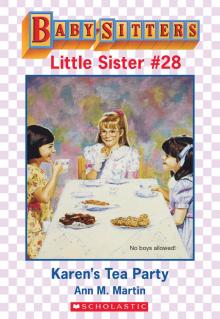 Karen's Tea Party
Karen's Tea Party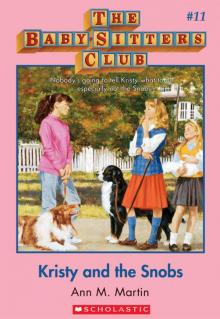 Kristy and the Snobs
Kristy and the Snobs Best Kept Secret
Best Kept Secret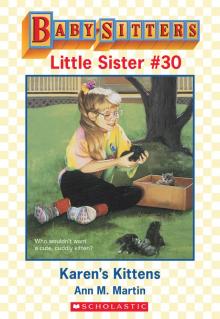 Karen's Kittens
Karen's Kittens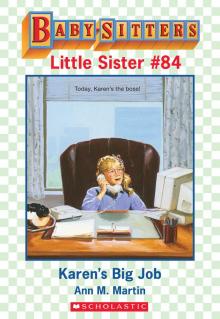 Karen's Big Job
Karen's Big Job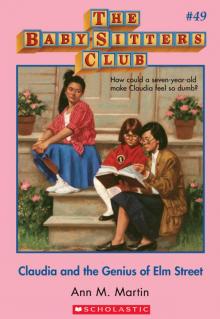 Claudia and the Genius of Elm Street
Claudia and the Genius of Elm Street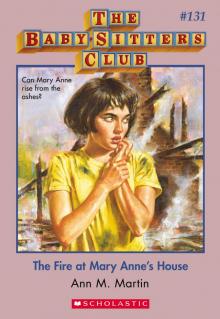 The Fire at Mary Anne's House
The Fire at Mary Anne's House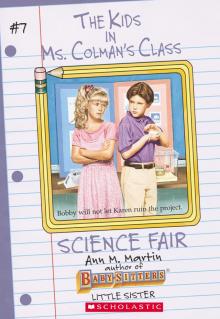 Science Fair
Science Fair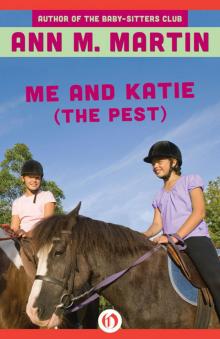 Me and Katie (The Pest)
Me and Katie (The Pest)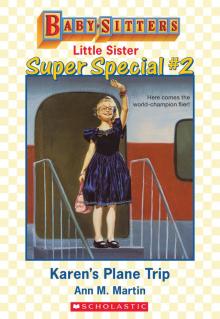 Karen's Plane Trip
Karen's Plane Trip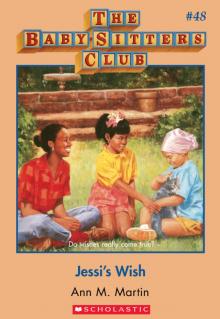 Jessi's Wish
Jessi's Wish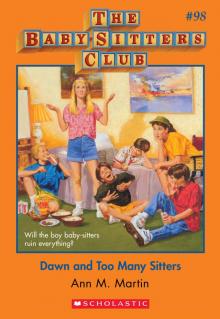 Dawn and Too Many Sitters
Dawn and Too Many Sitters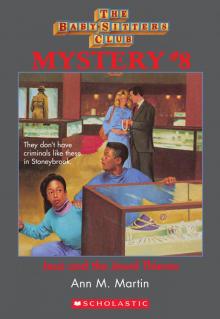 Jessi and the Jewel Thieves
Jessi and the Jewel Thieves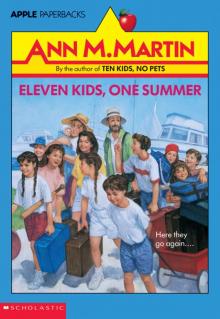 Eleven Kids, One Summer
Eleven Kids, One Summer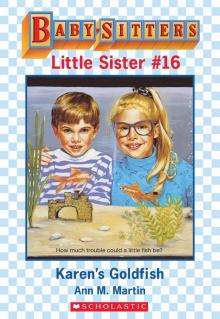 Karen's Goldfish
Karen's Goldfish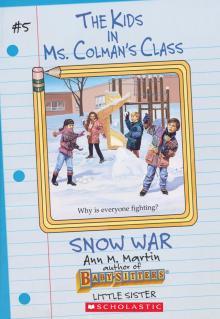 Snow War
Snow War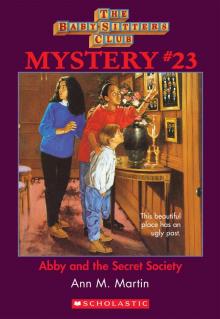 Abby and the Secret Society
Abby and the Secret Society Keeping Secrets
Keeping Secrets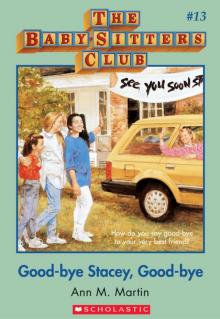 Good-Bye Stacey, Good-Bye
Good-Bye Stacey, Good-Bye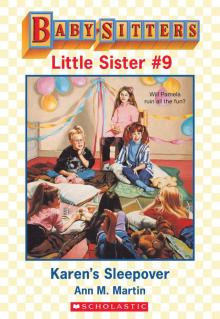 Karen's Sleepover
Karen's Sleepover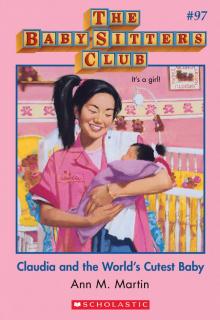 Claudia and the World's Cutest Baby
Claudia and the World's Cutest Baby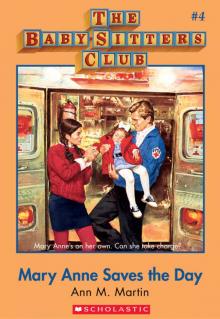 Mary Anne Saves the Day
Mary Anne Saves the Day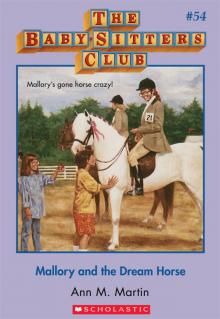 Mallory and the Dream Horse
Mallory and the Dream Horse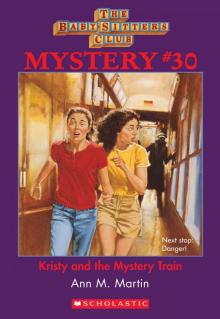 Kristy and the Mystery Train
Kristy and the Mystery Train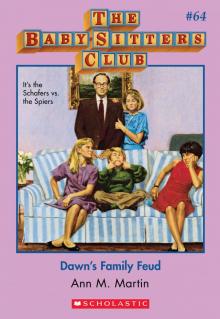 Dawn's Family Feud
Dawn's Family Feud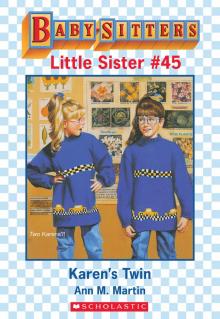 Karen's Twin
Karen's Twin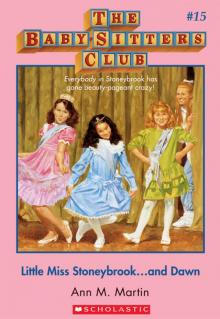 Little Miss Stoneybrook... And Dawn
Little Miss Stoneybrook... And Dawn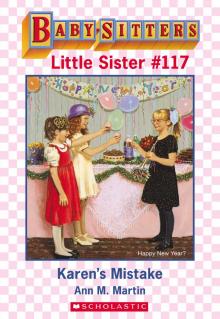 Karen's Mistake
Karen's Mistake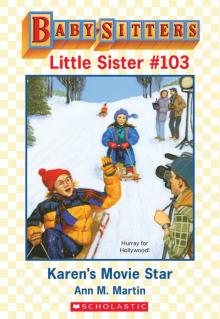 Karen's Movie Star
Karen's Movie Star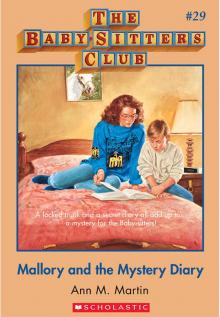 Mallory and the Mystery Diary
Mallory and the Mystery Diary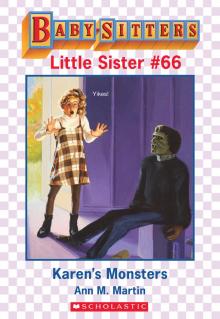 Karen's Monsters
Karen's Monsters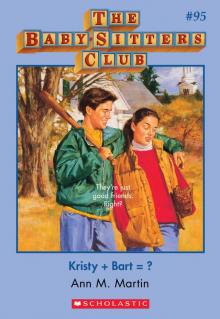 Kristy + Bart = ?
Kristy + Bart = ?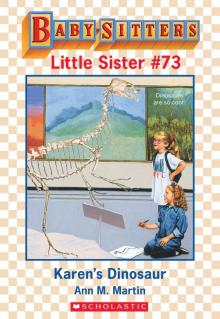 Karen's Dinosaur
Karen's Dinosaur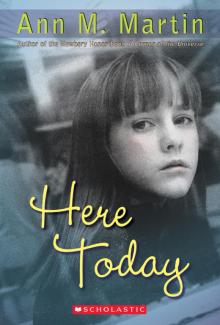 Here Today
Here Today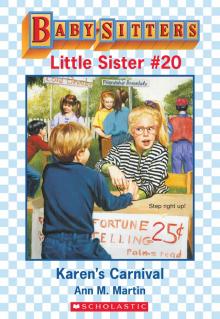 Karen's Carnival
Karen's Carnival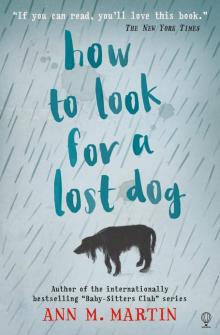 How to Look for a Lost Dog
How to Look for a Lost Dog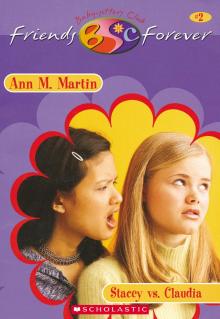 Stacey vs. Claudia
Stacey vs. Claudia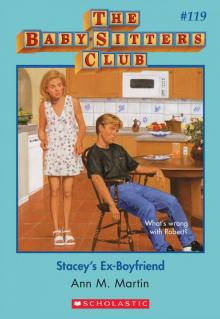 Stacey's Ex-Boyfriend
Stacey's Ex-Boyfriend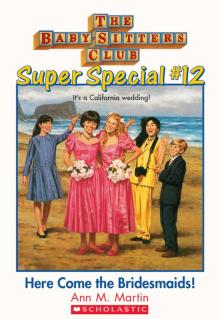 Here Come the Bridesmaids!
Here Come the Bridesmaids! Graduation Day
Graduation Day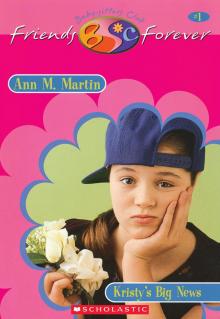 Kristy's Big News
Kristy's Big News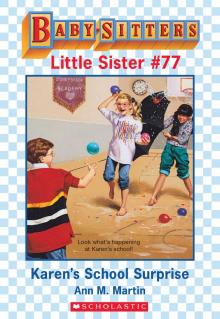 Karen's School Surprise
Karen's School Surprise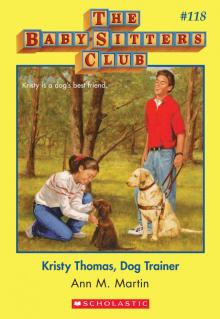 Kristy Thomas, Dog Trainer
Kristy Thomas, Dog Trainer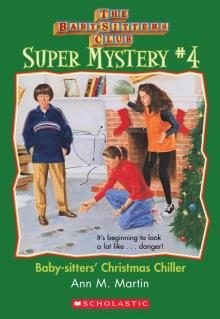 Baby-Sitters' Christmas Chiller
Baby-Sitters' Christmas Chiller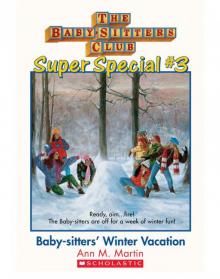 Baby-Sitters' Winter Vacation
Baby-Sitters' Winter Vacation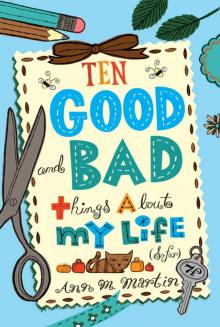 Ten Good and Bad Things About My Life
Ten Good and Bad Things About My Life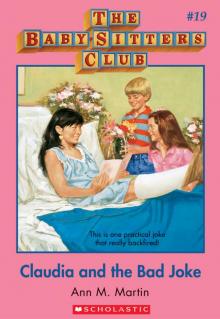 Claudia and the Bad Joke
Claudia and the Bad Joke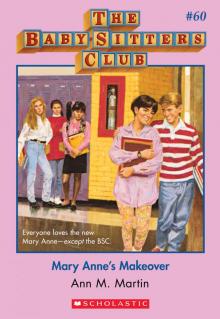 Mary Anne's Makeover
Mary Anne's Makeover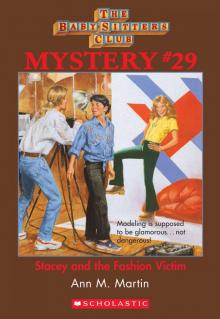 Stacey and the Fashion Victim
Stacey and the Fashion Victim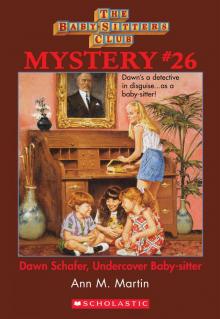 Dawn Schafer, Undercover Baby-Sitter
Dawn Schafer, Undercover Baby-Sitter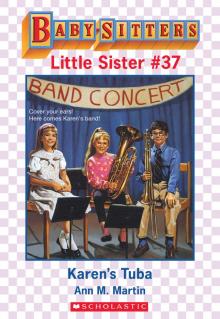 Karen's Tuba
Karen's Tuba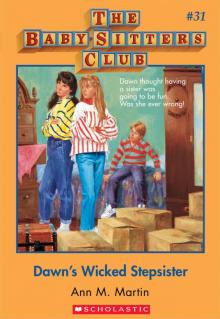 Dawn's Wicked Stepsister
Dawn's Wicked Stepsister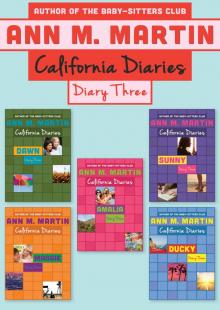 Diary Three: Dawn, Sunny, Maggie, Amalia, and Ducky
Diary Three: Dawn, Sunny, Maggie, Amalia, and Ducky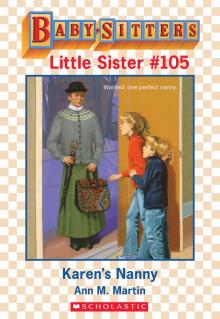 Karen's Nanny
Karen's Nanny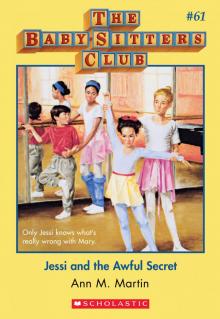 Jessi and the Awful Secret
Jessi and the Awful Secret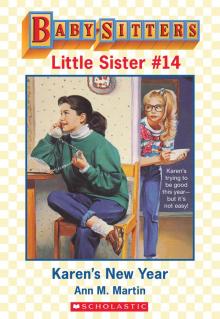 Karen's New Year
Karen's New Year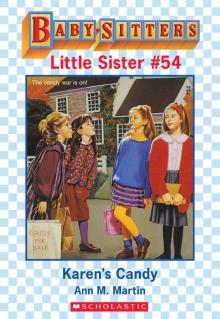 Karen's Candy
Karen's Candy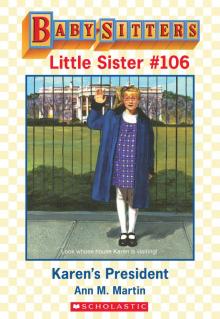 Karen's President
Karen's President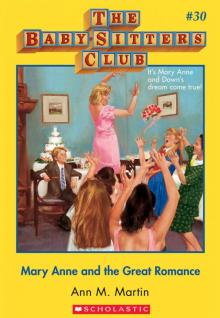 Mary Anne and the Great Romance
Mary Anne and the Great Romance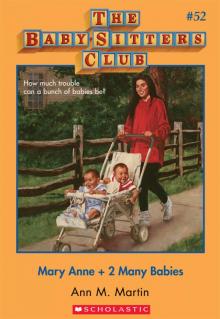 Mary Anne + 2 Many Babies
Mary Anne + 2 Many Babies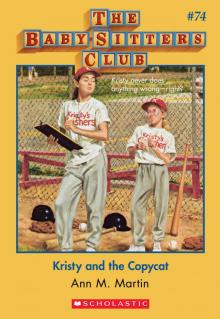 Kristy and the Copycat
Kristy and the Copycat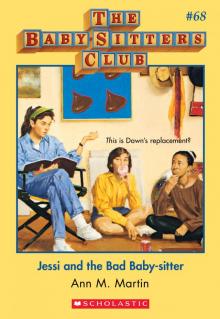 Jessi and the Bad Baby-Sitter
Jessi and the Bad Baby-Sitter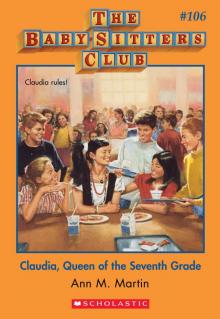 Claudia, Queen of the Seventh Grade
Claudia, Queen of the Seventh Grade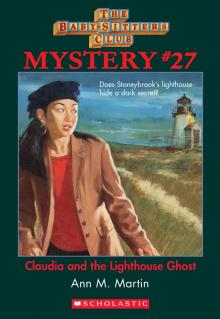 Claudia and the Lighthouse Ghost
Claudia and the Lighthouse Ghost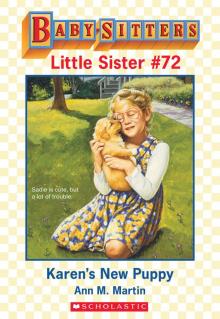 Karen's New Puppy
Karen's New Puppy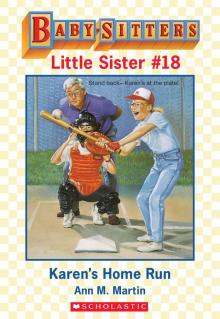 Karen's Home Run
Karen's Home Run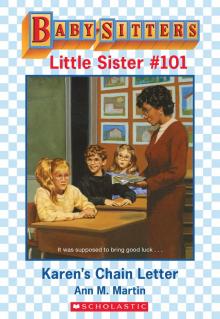 Karen's Chain Letter
Karen's Chain Letter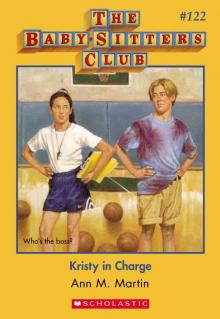 Kristy in Charge
Kristy in Charge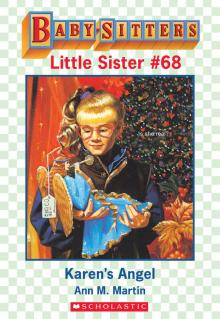 Karen's Angel
Karen's Angel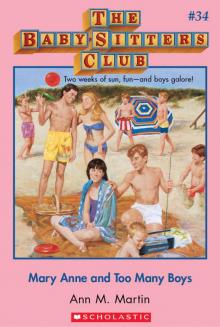 Mary Anne and Too Many Boys
Mary Anne and Too Many Boys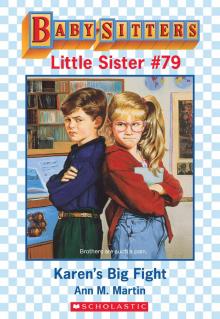 Karen's Big Fight
Karen's Big Fight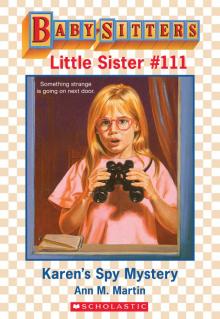 Karen's Spy Mystery
Karen's Spy Mystery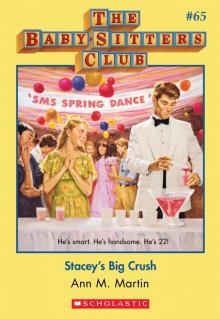 Stacey's Big Crush
Stacey's Big Crush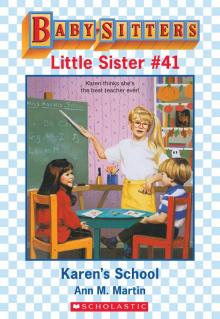 Karen's School
Karen's School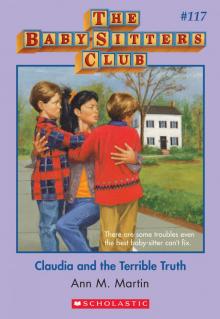 Claudia and the Terrible Truth
Claudia and the Terrible Truth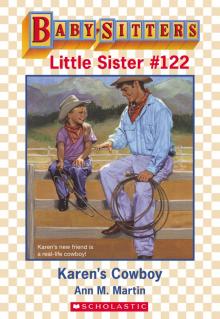 Karen's Cowboy
Karen's Cowboy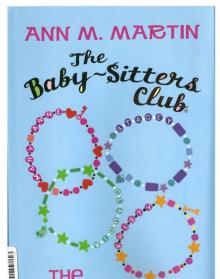 The Summer Before
The Summer Before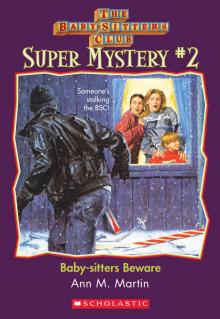 Beware, Dawn!
Beware, Dawn!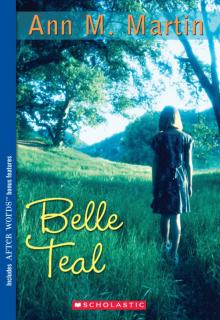 Belle Teale
Belle Teale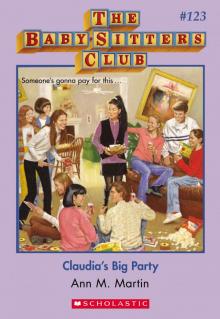 Claudia's Big Party
Claudia's Big Party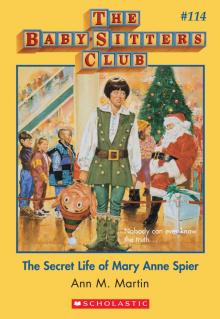 The Secret Life of Mary Anne Spier
The Secret Life of Mary Anne Spier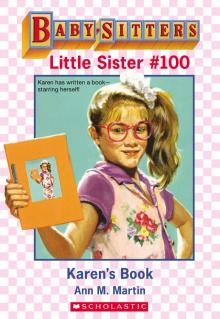 Karen's Book
Karen's Book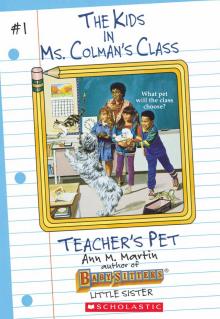 Teacher's Pet
Teacher's Pet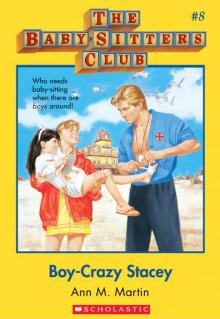 Boy-Crazy Stacey
Boy-Crazy Stacey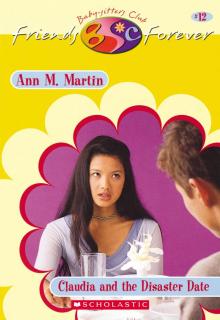 Claudia and the Disaster Date
Claudia and the Disaster Date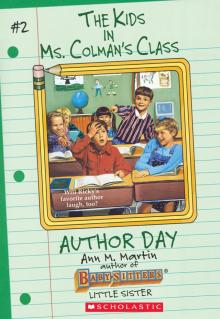 Author Day
Author Day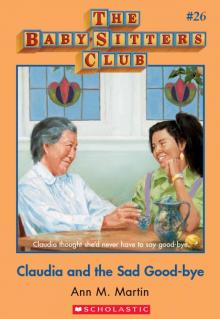 Claudia and the Sad Good-Bye
Claudia and the Sad Good-Bye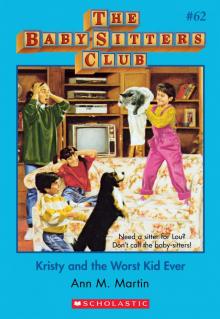 Kristy and the Worst Kid Ever
Kristy and the Worst Kid Ever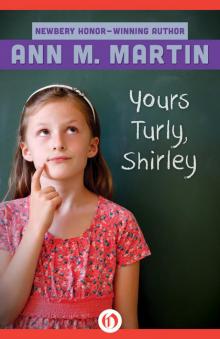 Yours Turly, Shirley
Yours Turly, Shirley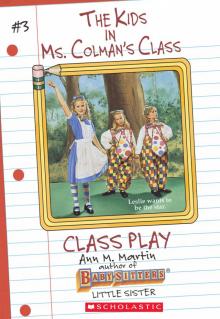 Class Play
Class Play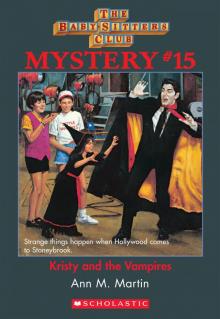 Kristy and the Vampires
Kristy and the Vampires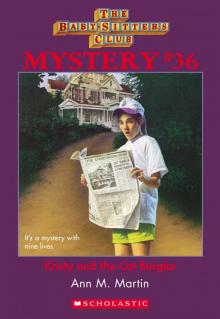 Kristy and the Cat Burglar
Kristy and the Cat Burglar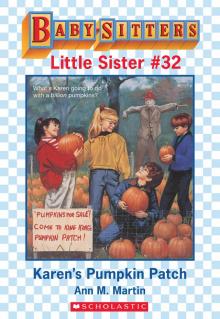 Karen's Pumpkin Patch
Karen's Pumpkin Patch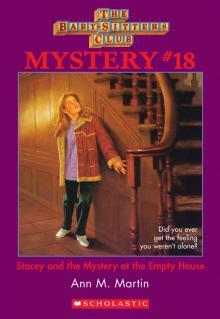 Stacey and the Mystery at the Empty House
Stacey and the Mystery at the Empty House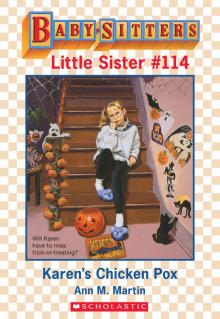 Karen's Chicken Pox
Karen's Chicken Pox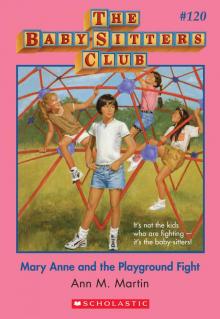 Mary Anne and the Playground Fight
Mary Anne and the Playground Fight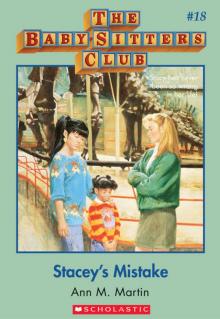 Stacey's Mistake
Stacey's Mistake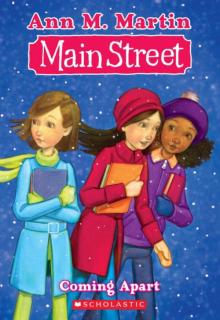 Coming Apart
Coming Apart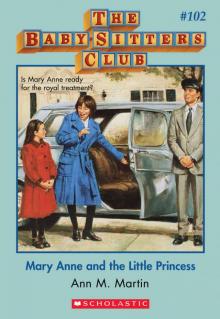 Mary Anne and the Little Princess
Mary Anne and the Little Princess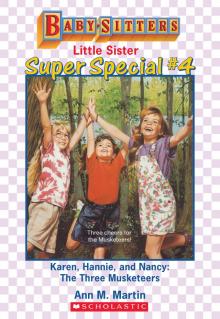 Karen, Hannie and Nancy: The Three Musketeers
Karen, Hannie and Nancy: The Three Musketeers 'Tis the Season
'Tis the Season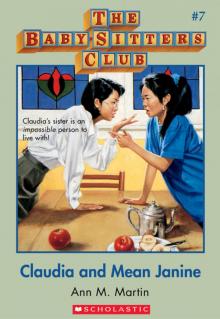 Claudia and Mean Janine
Claudia and Mean Janine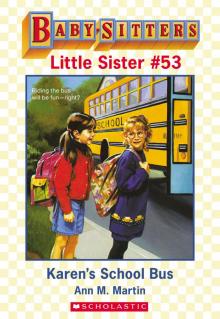 Karen's School Bus
Karen's School Bus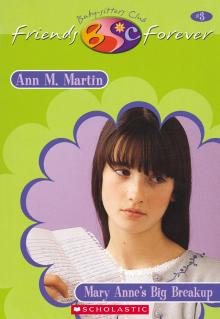 Mary Anne's Big Breakup
Mary Anne's Big Breakup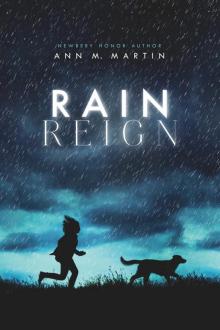 Rain Reign
Rain Reign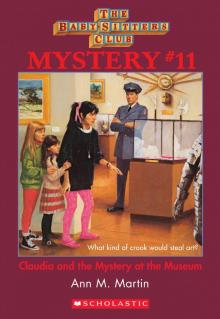 Claudia and the Mystery at the Museum
Claudia and the Mystery at the Museum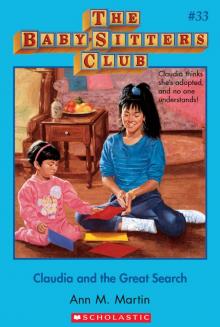 Claudia and the Great Search
Claudia and the Great Search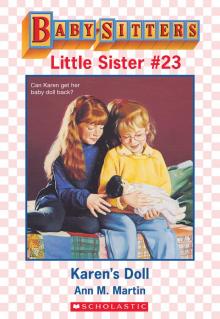 Karen's Doll
Karen's Doll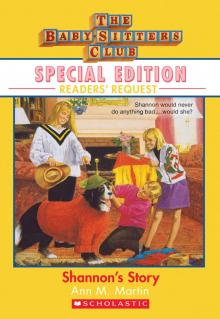 Shannon's Story
Shannon's Story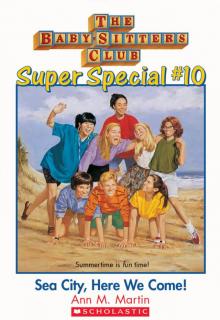 Sea City, Here We Come!
Sea City, Here We Come!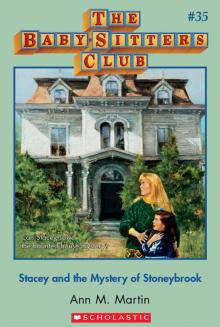 Stacey and the Mystery of Stoneybrook
Stacey and the Mystery of Stoneybrook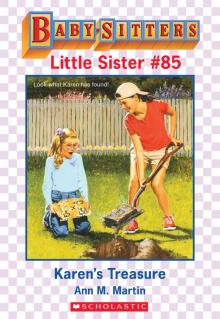 Karen's Treasure
Karen's Treasure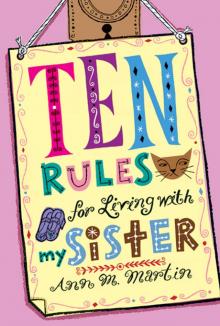 Ten Rules for Living With My Sister
Ten Rules for Living With My Sister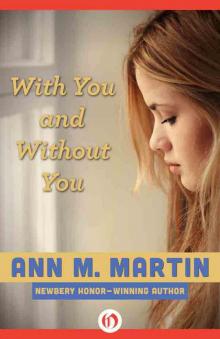 With You and Without You
With You and Without You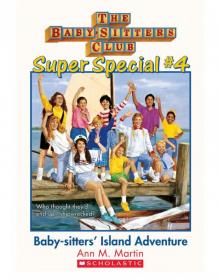 Baby-Sitters' Island Adventure
Baby-Sitters' Island Adventure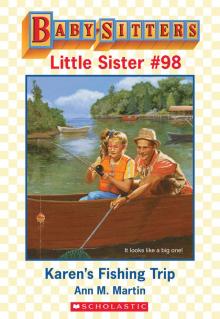 Karen's Fishing Trip
Karen's Fishing Trip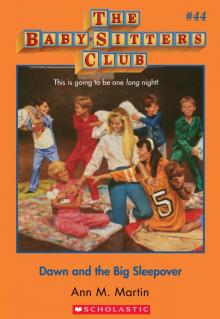 Dawn and the Big Sleepover
Dawn and the Big Sleepover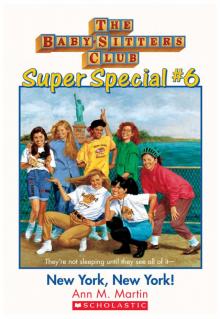 New York, New York!
New York, New York!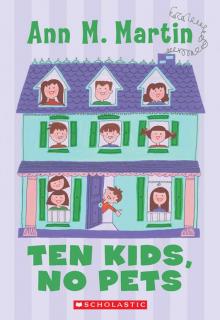 Ten Kids, No Pets
Ten Kids, No Pets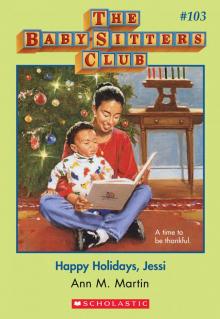 Happy Holidays, Jessi
Happy Holidays, Jessi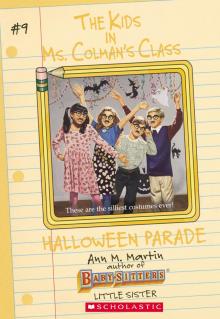 Halloween Parade
Halloween Parade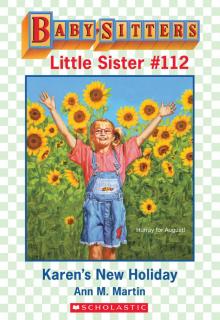 Karen's New Holiday
Karen's New Holiday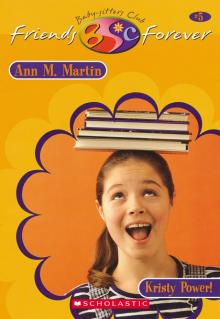 Kristy Power!
Kristy Power!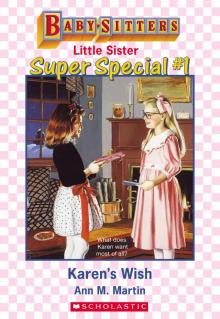 Karen's Wish
Karen's Wish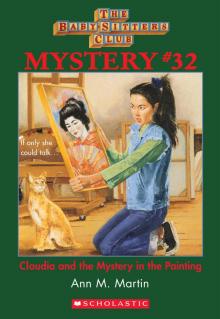 Claudia and the Mystery in the Painting
Claudia and the Mystery in the Painting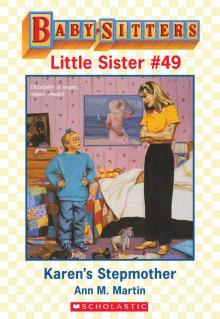 Karen's Stepmother
Karen's Stepmother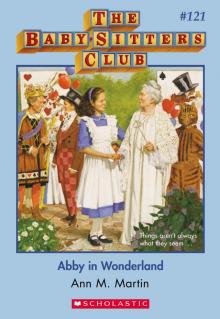 Abby in Wonderland
Abby in Wonderland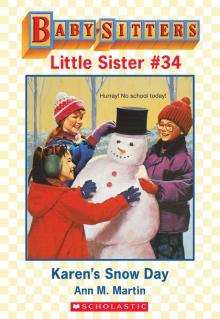 Karen's Snow Day
Karen's Snow Day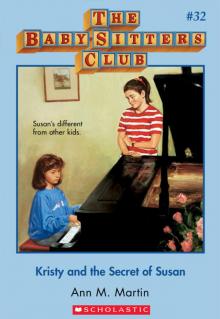 Kristy and the Secret of Susan
Kristy and the Secret of Susan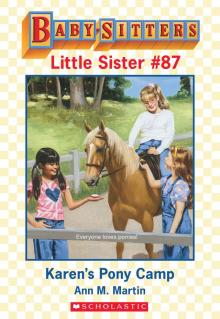 Karen's Pony Camp
Karen's Pony Camp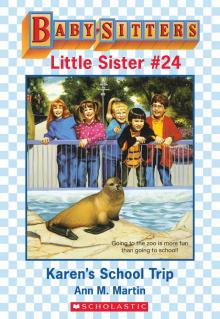 Karen's School Trip
Karen's School Trip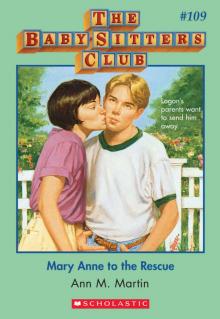 Mary Anne to the Rescue
Mary Anne to the Rescue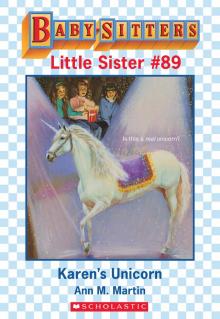 Karen's Unicorn
Karen's Unicorn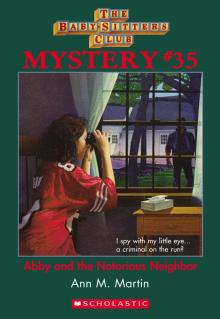 Abby and the Notorious Neighbor
Abby and the Notorious Neighbor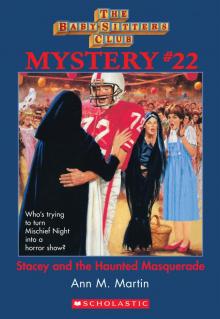 Stacey and the Haunted Masquerade
Stacey and the Haunted Masquerade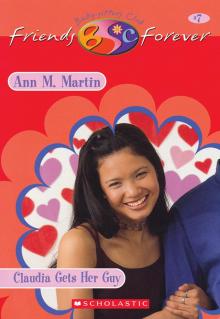 Claudia Gets Her Guy
Claudia Gets Her Guy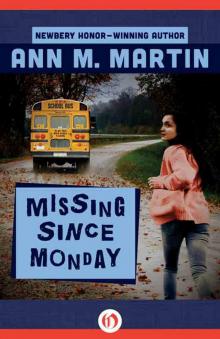 Missing Since Monday
Missing Since Monday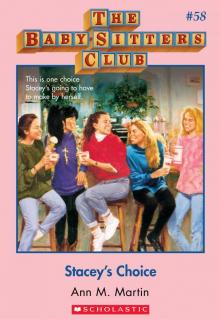 Stacey's Choice
Stacey's Choice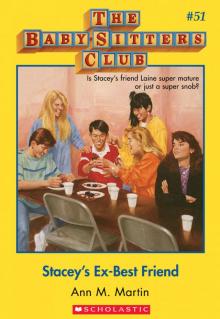 Stacey's Ex-Best Friend
Stacey's Ex-Best Friend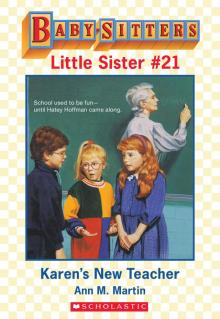 Karen's New Teacher
Karen's New Teacher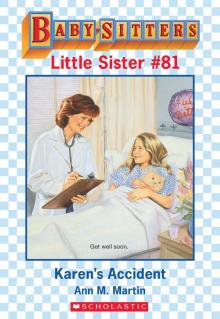 Karen's Accident
Karen's Accident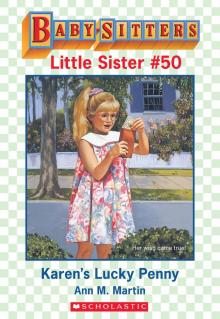 Karen's Lucky Penny
Karen's Lucky Penny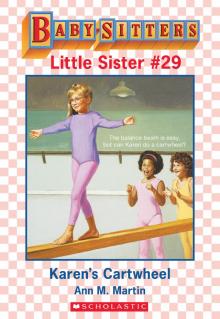 Karen's Cartwheel
Karen's Cartwheel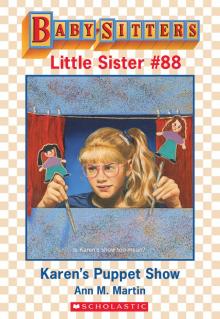 Karen's Puppet Show
Karen's Puppet Show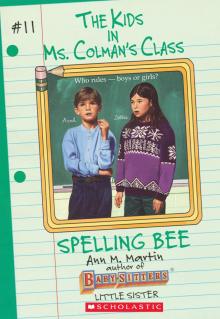 Spelling Bee
Spelling Bee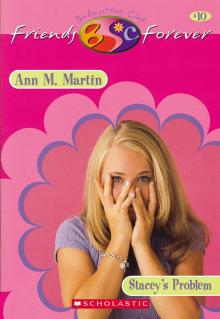 Stacey's Problem
Stacey's Problem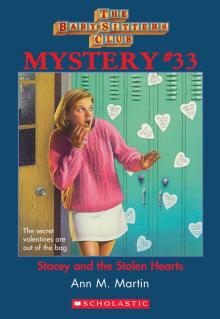 Stacey and the Stolen Hearts
Stacey and the Stolen Hearts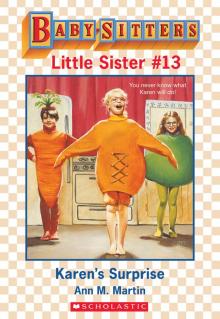 Karen's Surprise
Karen's Surprise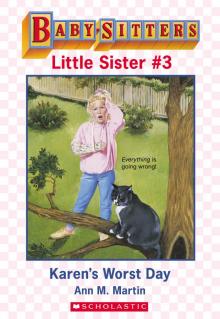 Karen's Worst Day
Karen's Worst Day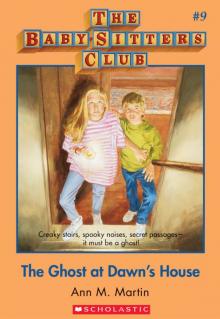 The Ghost at Dawn's House
The Ghost at Dawn's House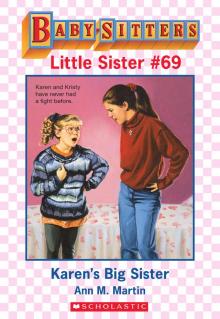 Karen's Big Sister
Karen's Big Sister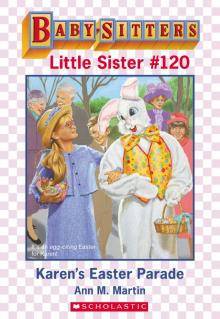 Karen's Easter Parade
Karen's Easter Parade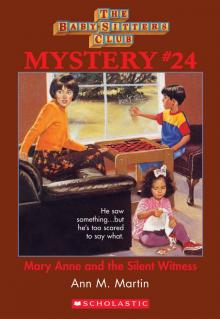 Mary Anne and the Silent Witness
Mary Anne and the Silent Witness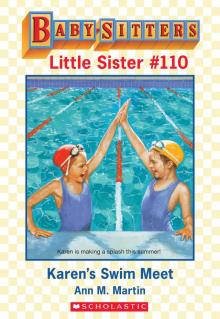 Karen's Swim Meet
Karen's Swim Meet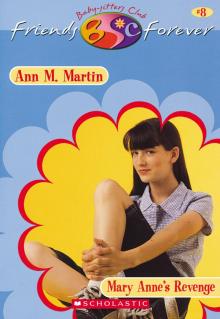 Mary Anne's Revenge
Mary Anne's Revenge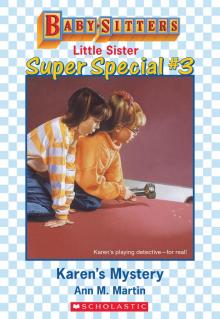 Karen's Mystery
Karen's Mystery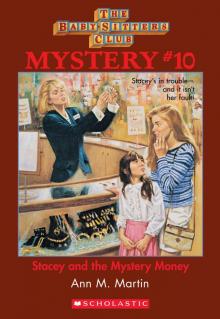 Stacey and the Mystery Money
Stacey and the Mystery Money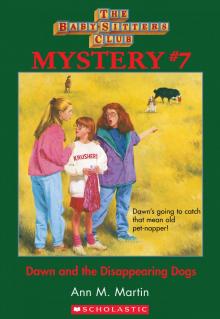 Dawn and the Disappearing Dogs
Dawn and the Disappearing Dogs Karen's Christmas Tree
Karen's Christmas Tree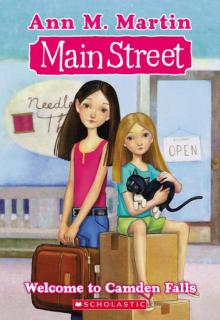 Welcome to Camden Falls
Welcome to Camden Falls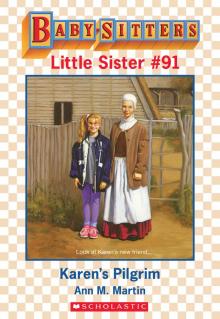 Karen's Pilgrim
Karen's Pilgrim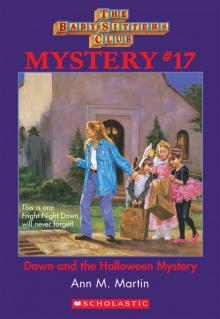 Dawn and the Halloween Mystery
Dawn and the Halloween Mystery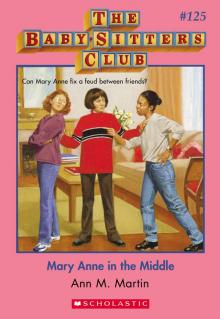 Mary Anne in the Middle
Mary Anne in the Middle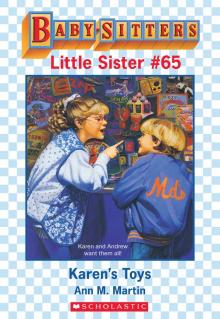 Karen's Toys
Karen's Toys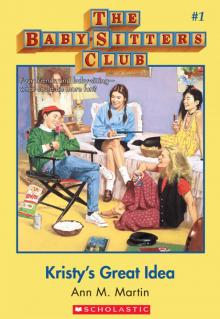 Kristy's Great Idea
Kristy's Great Idea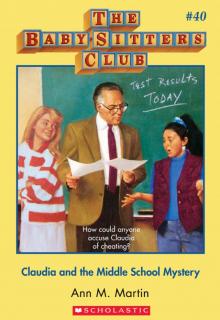 Claudia and the Middle School Mystery
Claudia and the Middle School Mystery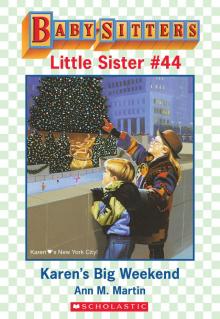 Karen's Big Weekend
Karen's Big Weekend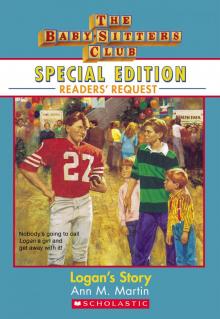 Logan's Story
Logan's Story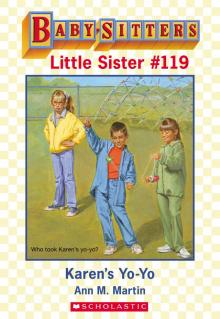 Karen's Yo-Yo
Karen's Yo-Yo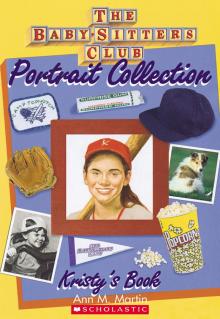 Kristy's Book
Kristy's Book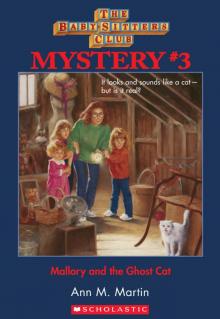 Mallory and the Ghost Cat
Mallory and the Ghost Cat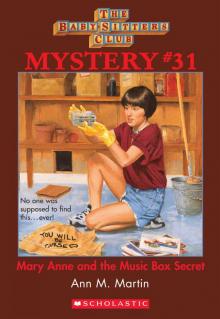 Mary Anne and the Music
Mary Anne and the Music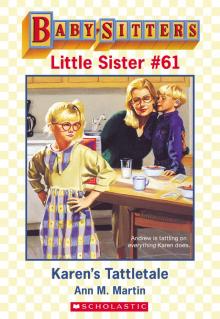 Karen's Tattletale
Karen's Tattletale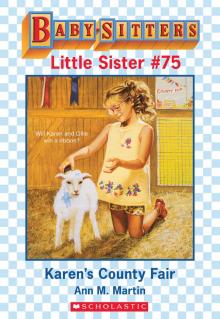 Karen's County Fair
Karen's County Fair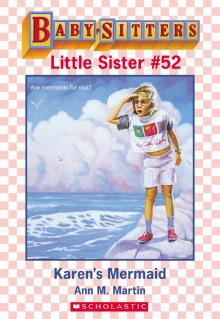 Karen's Mermaid
Karen's Mermaid Snowbound
Snowbound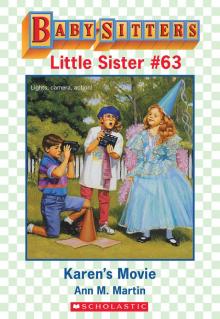 Karen's Movie
Karen's Movie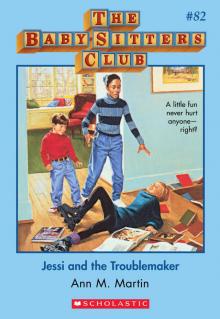 Jessi and the Troublemaker
Jessi and the Troublemaker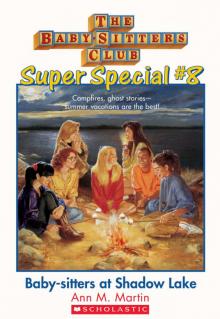 Baby-Sitters at Shadow Lake
Baby-Sitters at Shadow Lake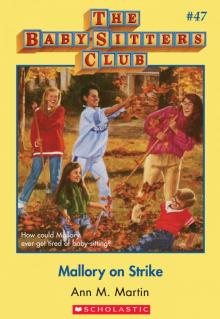 Mallory on Strike
Mallory on Strike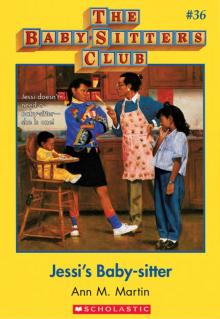 Jessi's Baby-Sitter
Jessi's Baby-Sitter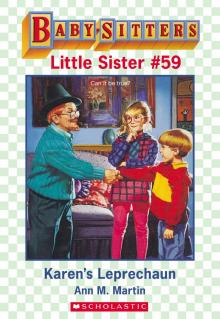 Karen's Leprechaun
Karen's Leprechaun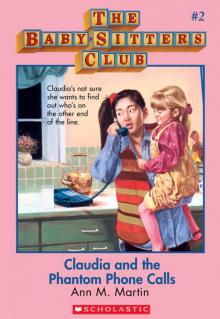 Claudia and the Phantom Phone Calls
Claudia and the Phantom Phone Calls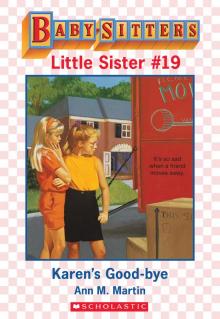 Karen's Good-Bye
Karen's Good-Bye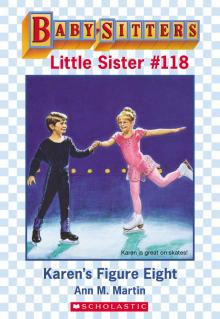 Karen's Figure Eight
Karen's Figure Eight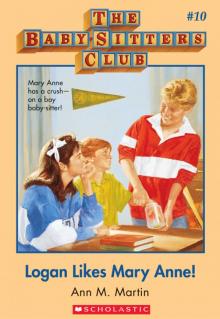 Logan Likes Mary Anne!
Logan Likes Mary Anne!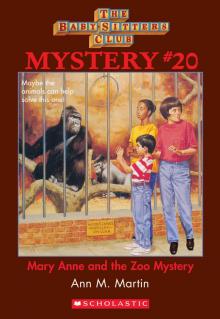 Mary Anne and the Zoo Mystery
Mary Anne and the Zoo Mystery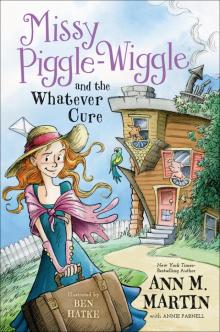 Missy Piggle-Wiggle and the Whatever Cure
Missy Piggle-Wiggle and the Whatever Cure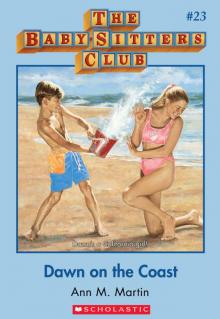 Dawn on the Coast
Dawn on the Coast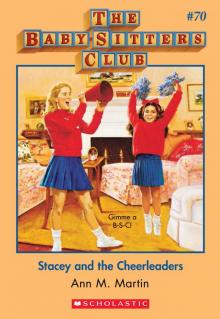 Stacey and the Cheerleaders
Stacey and the Cheerleaders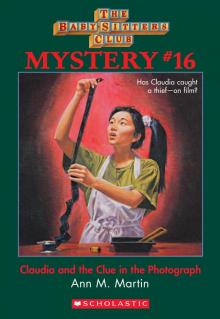 Claudia and the Clue in the Photograph
Claudia and the Clue in the Photograph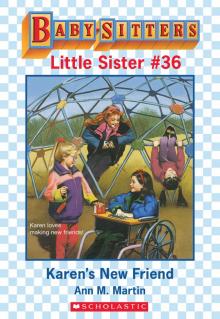 Karen's New Friend
Karen's New Friend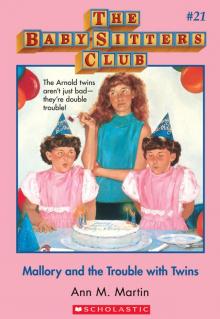 Mallory and the Trouble With Twins
Mallory and the Trouble With Twins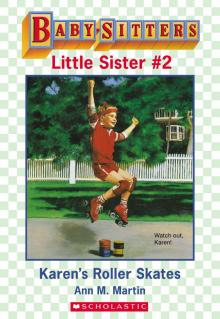 Karen's Roller Skates
Karen's Roller Skates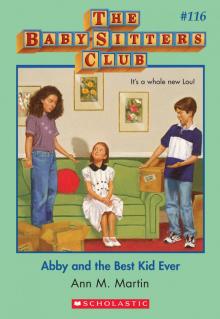 Abby and the Best Kid Ever
Abby and the Best Kid Ever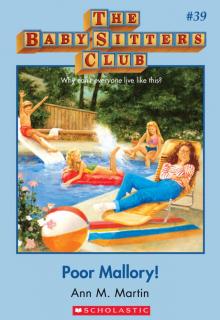 Poor Mallory!
Poor Mallory!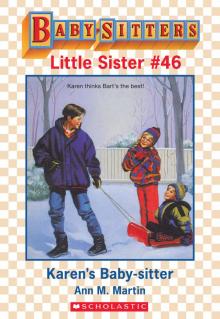 Karen's Witch
Karen's Witch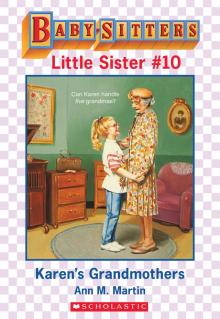 Karen's Grandmothers
Karen's Grandmothers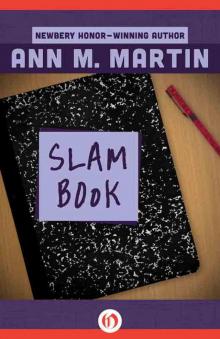 Slam Book
Slam Book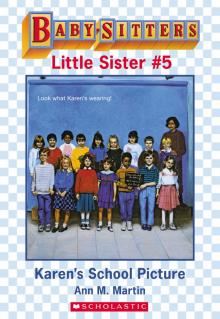 Karen's School Picture
Karen's School Picture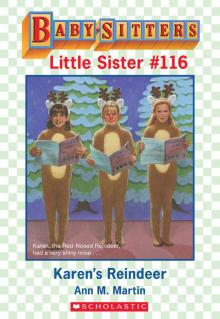 Karen's Reindeer
Karen's Reindeer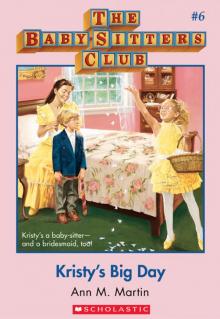 Kristy's Big Day
Kristy's Big Day The Long Way Home
The Long Way Home Karen's Sleigh Ride
Karen's Sleigh Ride On Christmas Eve
On Christmas Eve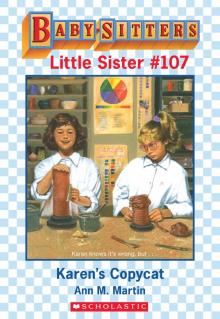 Karen's Copycat
Karen's Copycat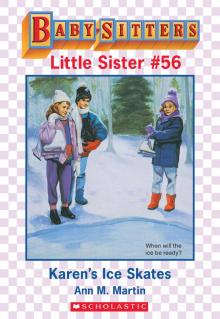 Karen's Ice Skates
Karen's Ice Skates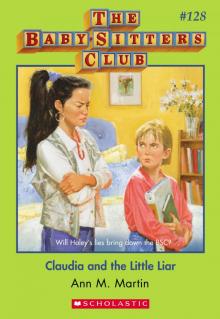 Claudia and the Little Liar
Claudia and the Little Liar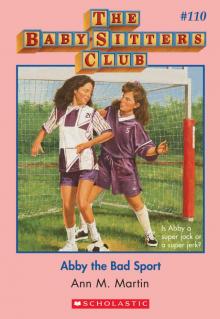 Abby the Bad Sport
Abby the Bad Sport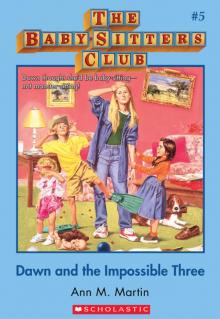 The Baby-Sitters Club #5: Dawn and the Impossible Three
The Baby-Sitters Club #5: Dawn and the Impossible Three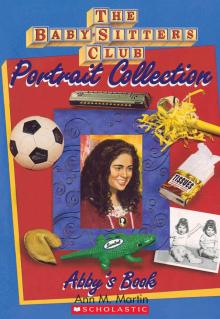 Abby's Book
Abby's Book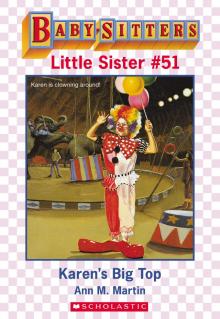 Karen's Big Top
Karen's Big Top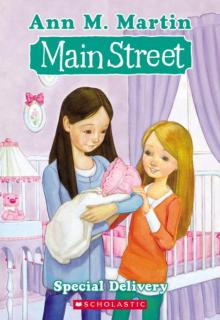 Main Street #8: Special Delivery
Main Street #8: Special Delivery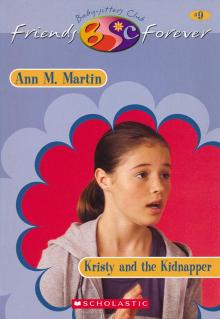 Kristy and the Kidnapper
Kristy and the Kidnapper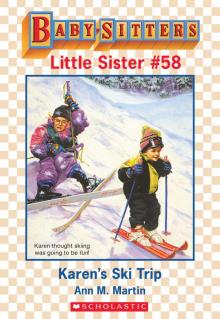 Karen's Ski Trip
Karen's Ski Trip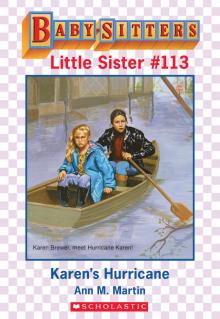 Karen's Hurricane
Karen's Hurricane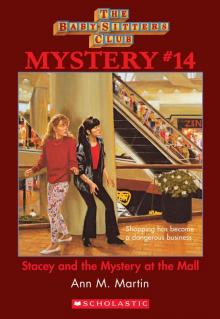 Stacey and the Mystery at the Mall
Stacey and the Mystery at the Mall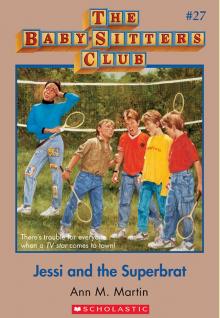 Jessi and the Superbrat
Jessi and the Superbrat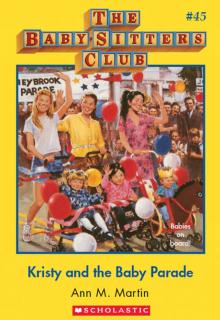 Kristy and the Baby Parade
Kristy and the Baby Parade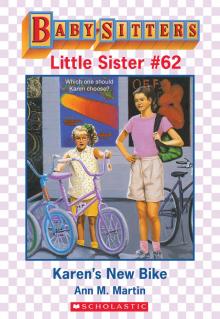 Karen's New Bike
Karen's New Bike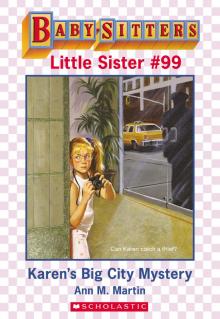 Karen's Big City Mystery
Karen's Big City Mystery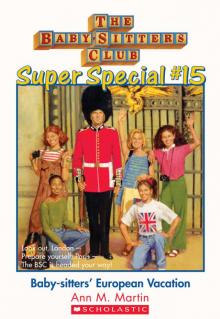 Baby-Sitters' European Vacation
Baby-Sitters' European Vacation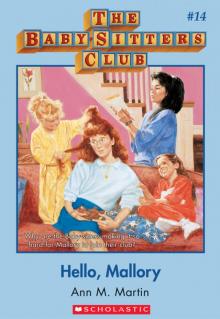 Hello, Mallory
Hello, Mallory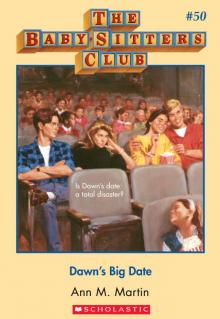 Dawn's Big Date
Dawn's Big Date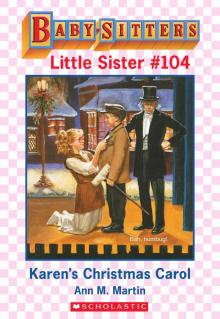 Karen's Christmas Carol
Karen's Christmas Carol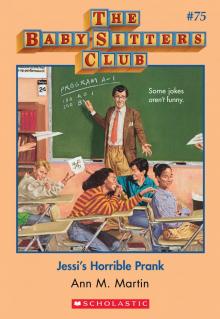 Jessi's Horrible Prank
Jessi's Horrible Prank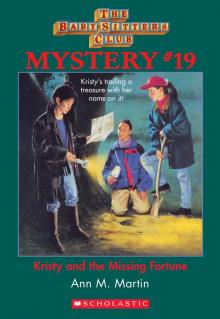 Kristy and the Missing Fortune
Kristy and the Missing Fortune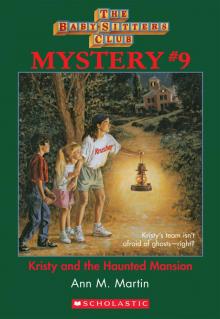 Kristy and the Haunted Mansion
Kristy and the Haunted Mansion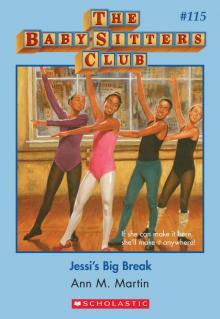 Jessi's Big Break
Jessi's Big Break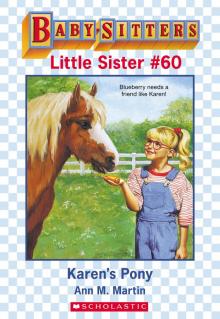 Karen's Pony
Karen's Pony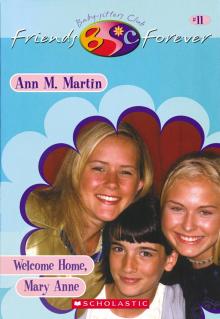 Welcome Home, Mary Anne
Welcome Home, Mary Anne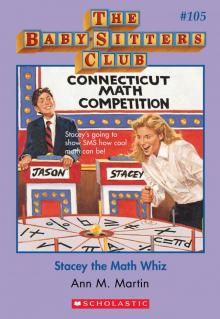 Stacey the Math Whiz
Stacey the Math Whiz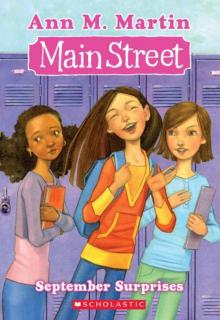 September Surprises
September Surprises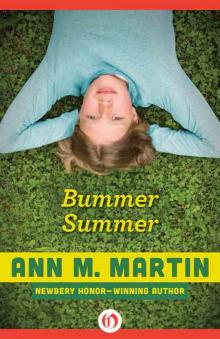 Bummer Summer
Bummer Summer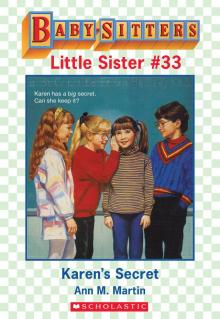 Karen's Secret
Karen's Secret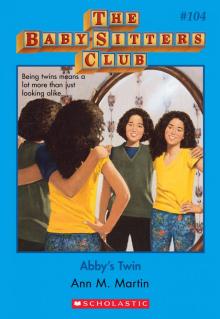 Abby's Twin
Abby's Twin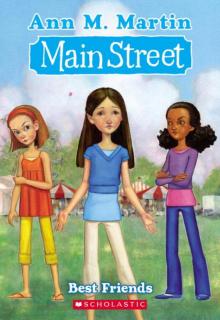 Main Street #4: Best Friends
Main Street #4: Best Friends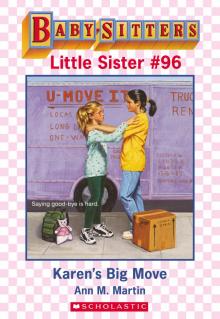 Karen's Big Move
Karen's Big Move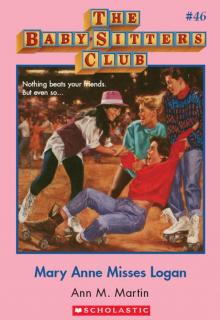 Mary Anne Misses Logan
Mary Anne Misses Logan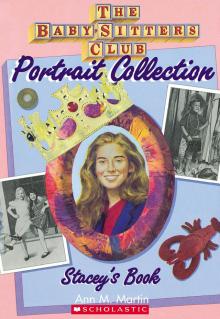 Stacey's Book
Stacey's Book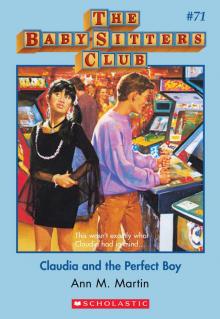 Claudia and the Perfect Boy
Claudia and the Perfect Boy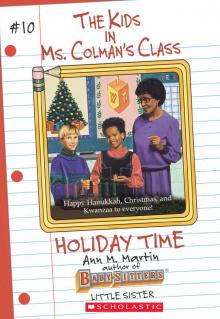 Holiday Time
Holiday Time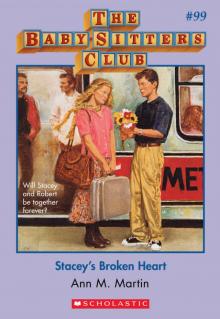 Stacey's Broken Heart
Stacey's Broken Heart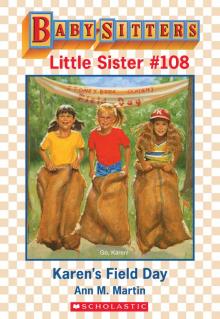 Karen's Field Day
Karen's Field Day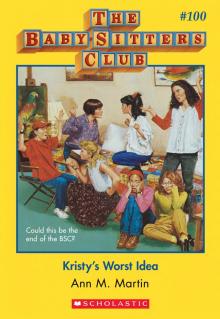 Kristy's Worst Idea
Kristy's Worst Idea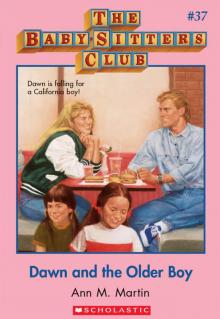 Dawn and the Older Boy
Dawn and the Older Boy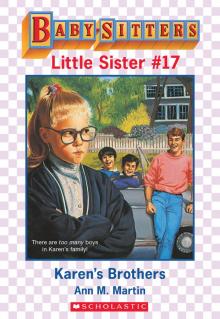 Karen's Brothers
Karen's Brothers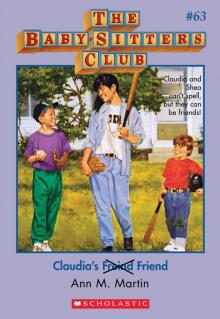 Claudia's Friend
Claudia's Friend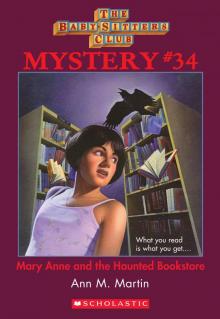 Mary Anne and the Haunted Bookstore
Mary Anne and the Haunted Bookstore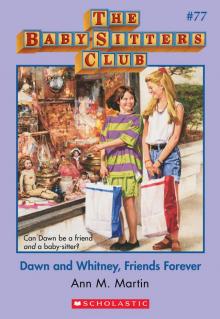 Dawn and Whitney, Friends Forever
Dawn and Whitney, Friends Forever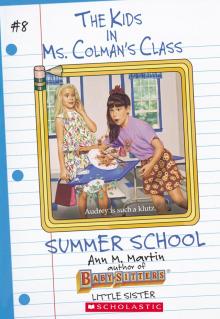 Summer School
Summer School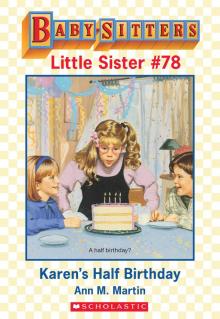 Karen's Birthday
Karen's Birthday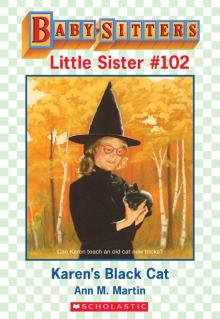 Karen's Black Cat
Karen's Black Cat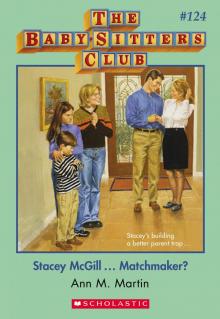 Stacey McGill... Matchmaker?
Stacey McGill... Matchmaker?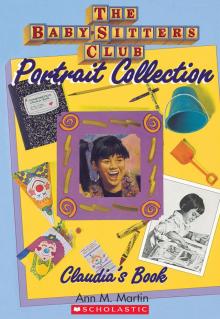 Claudia's Book
Claudia's Book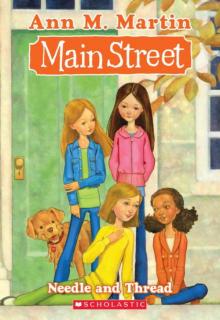 Main Street #2: Needle and Thread
Main Street #2: Needle and Thread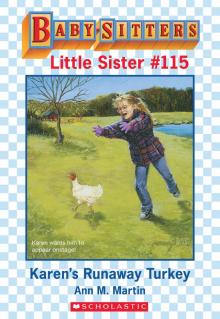 Karen's Runaway Turkey
Karen's Runaway Turkey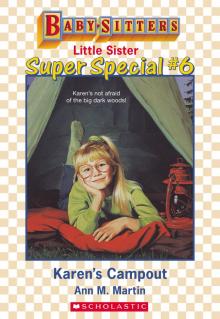 Karen's Campout
Karen's Campout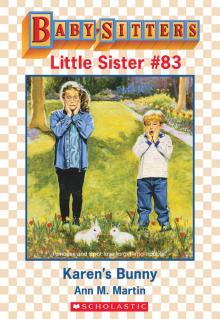 Karen's Bunny
Karen's Bunny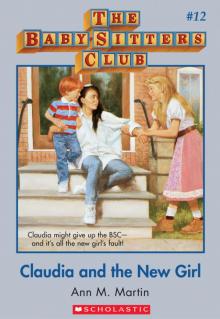 Claudia and the New Girl
Claudia and the New Girl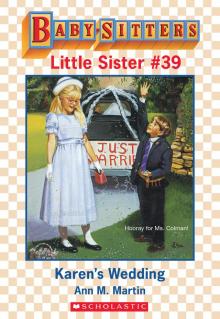 Karen's Wedding
Karen's Wedding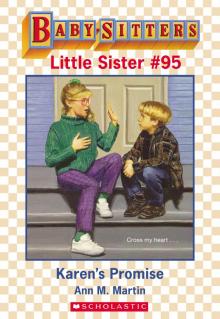 Karen's Promise
Karen's Promise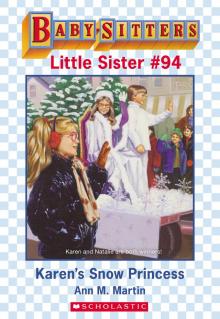 Karen's Snow Princess
Karen's Snow Princess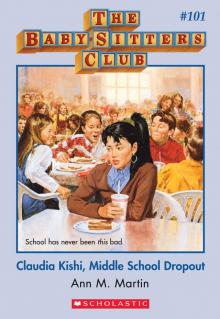 Claudia Kishi, Middle School Dropout
Claudia Kishi, Middle School Dropout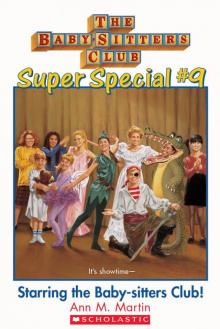 Starring the Baby-Sitters Club!
Starring the Baby-Sitters Club!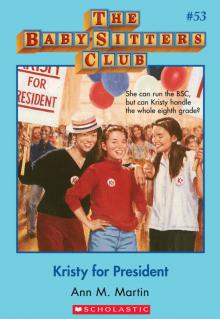 Kristy for President
Kristy for President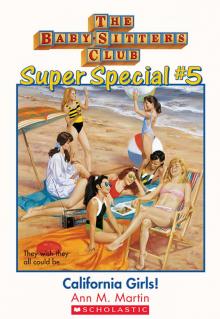 California Girls!
California Girls!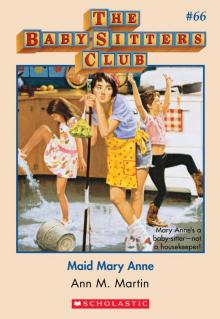 Maid Mary Anne
Maid Mary Anne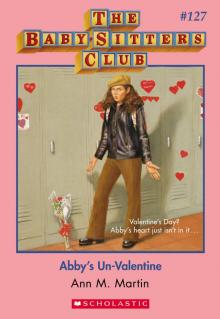 Abby's Un-Valentine
Abby's Un-Valentine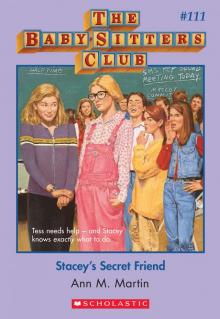 Stacey's Secret Friend
Stacey's Secret Friend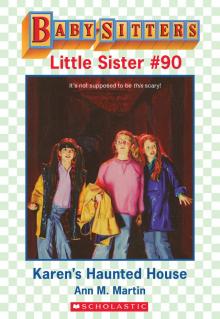 Karen's Haunted House
Karen's Haunted House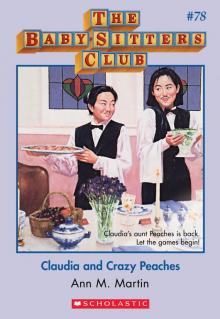 Claudia and Crazy Peaches
Claudia and Crazy Peaches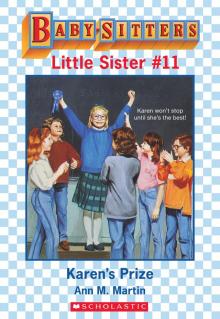 Karen's Prize
Karen's Prize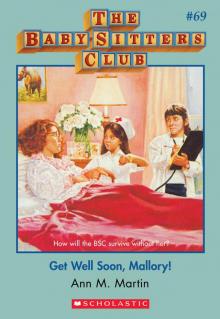 Get Well Soon, Mallory!
Get Well Soon, Mallory!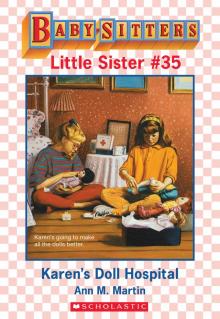 Karen's Doll Hospital
Karen's Doll Hospital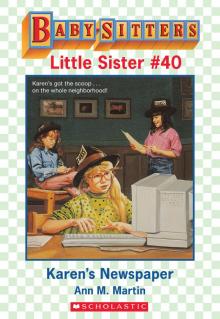 Karen's Newspaper
Karen's Newspaper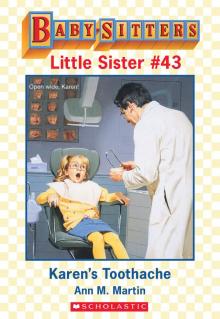 Karen's Toothache
Karen's Toothache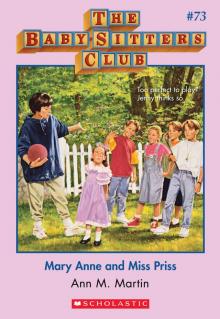 Mary Anne and Miss Priss
Mary Anne and Miss Priss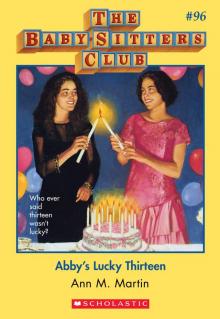 Abby's Lucky Thirteen
Abby's Lucky Thirteen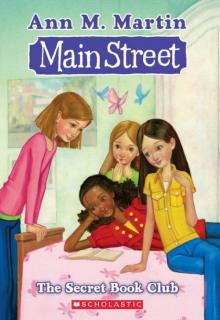 The Secret Book Club
The Secret Book Club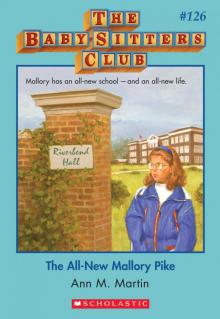 The All-New Mallory Pike
The All-New Mallory Pike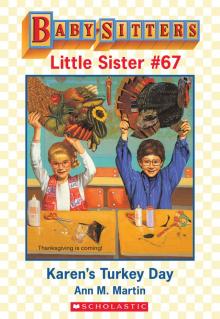 Karen's Turkey Day
Karen's Turkey Day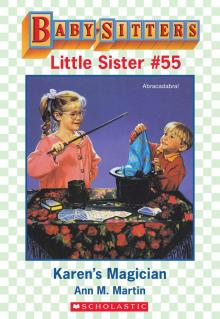 Karen's Magician
Karen's Magician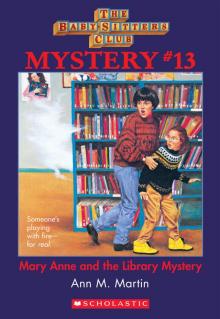 Mary Anne and the Library Mystery
Mary Anne and the Library Mystery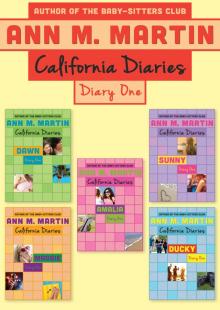 Diary One: Dawn, Sunny, Maggie, Amalia, and Ducky
Diary One: Dawn, Sunny, Maggie, Amalia, and Ducky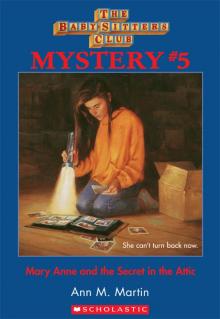 Mary Anne and the Secret in the Attic
Mary Anne and the Secret in the Attic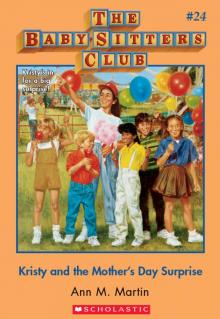 Kristy and the Mother's Day Surprise
Kristy and the Mother's Day Surprise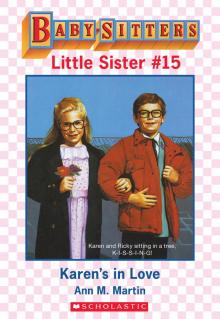 Karen's in Love
Karen's in Love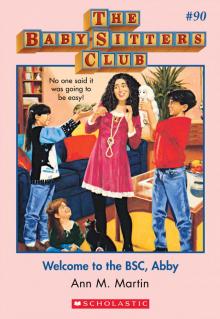 Welcome to the BSC, Abby
Welcome to the BSC, Abby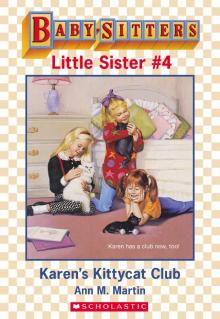 Karen's Kittycat Club
Karen's Kittycat Club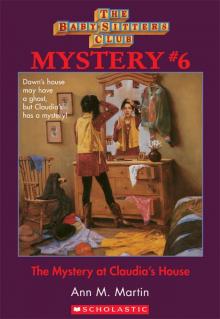 The Mystery at Claudia's House
The Mystery at Claudia's House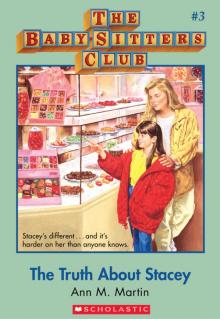 The Truth About Stacey
The Truth About Stacey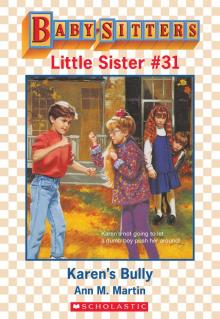 Karen's Bully
Karen's Bully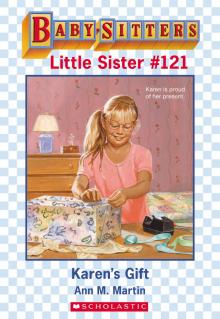 Karen's Gift
Karen's Gift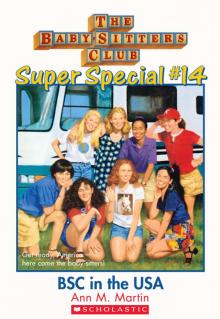 BSC in the USA
BSC in the USA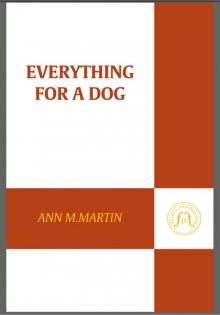 Everything for a Dog
Everything for a Dog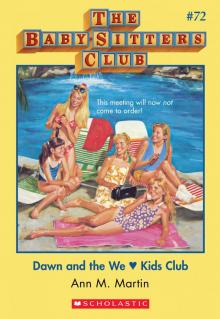 Dawn and the We Love Kids Club
Dawn and the We Love Kids Club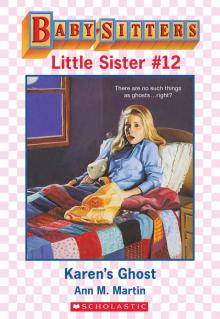 Karen's Ghost
Karen's Ghost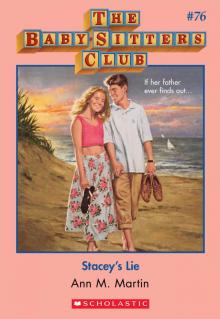 Stacey's Lie
Stacey's Lie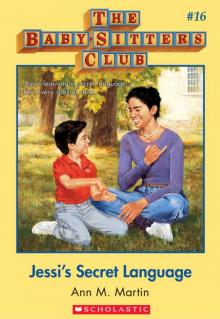 Jessi's Secret Language
Jessi's Secret Language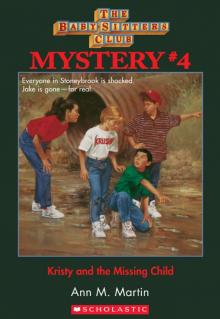 Kristy and the Missing Child
Kristy and the Missing Child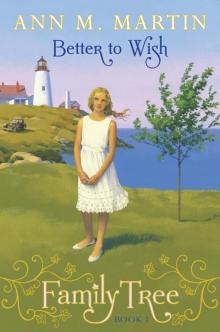 Better to Wish
Better to Wish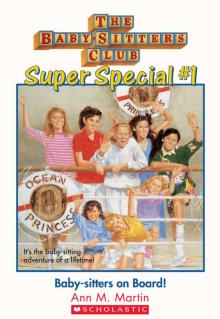 Baby-Sitters on Board!
Baby-Sitters on Board!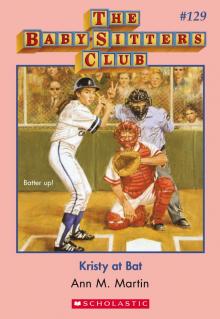 Kristy at Bat
Kristy at Bat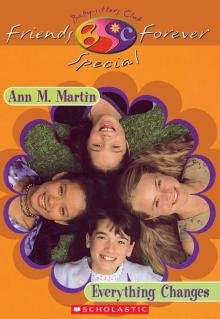 Everything Changes
Everything Changes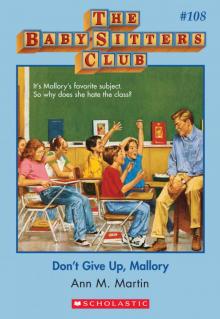 Don't Give Up, Mallory
Don't Give Up, Mallory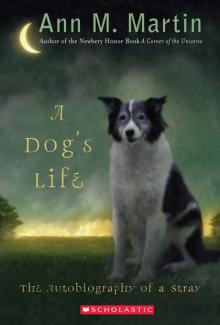 A Dog's Life: The Autobiography of a Stray
A Dog's Life: The Autobiography of a Stray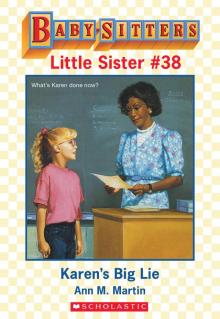 Karen's Big Lie
Karen's Big Lie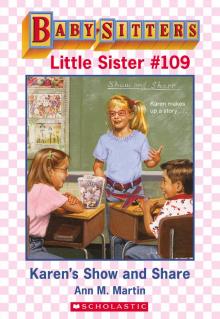 Karen's Show and Share
Karen's Show and Share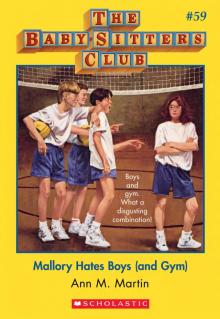 Mallory Hates Boys (and Gym)
Mallory Hates Boys (and Gym)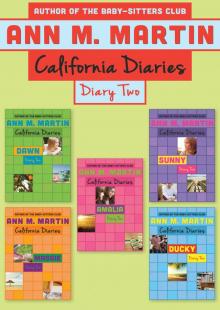 Diary Two: Dawn, Sunny, Maggie, Amalia, and Ducky
Diary Two: Dawn, Sunny, Maggie, Amalia, and Ducky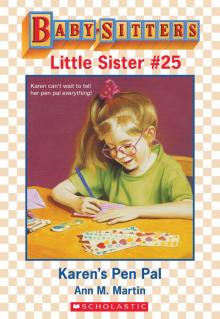 Karen's Pen Pal
Karen's Pen Pal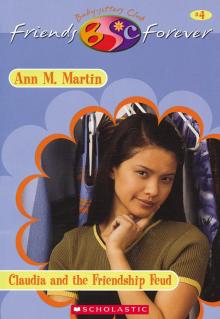 Claudia and the Friendship Feud
Claudia and the Friendship Feud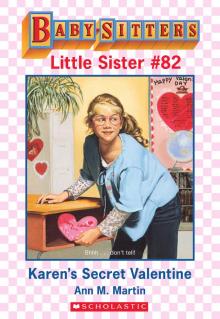 Karen's Secret Valentine
Karen's Secret Valentine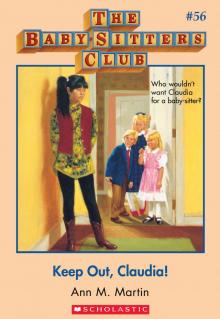 Keep Out, Claudia!
Keep Out, Claudia!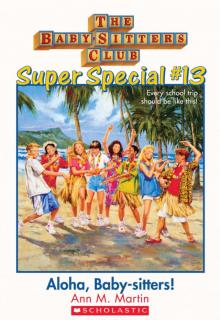 Aloha, Baby-Sitters!
Aloha, Baby-Sitters!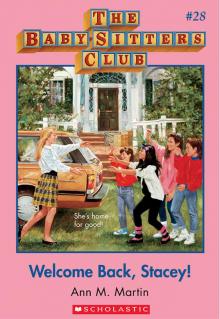 Welcome Back, Stacey
Welcome Back, Stacey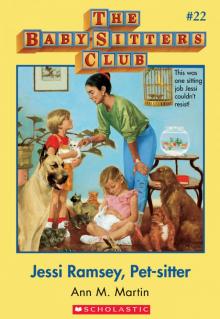 Jessi Ramsey, Pet-Sitter
Jessi Ramsey, Pet-Sitter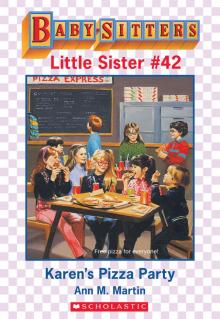 Karen's Pizza Party
Karen's Pizza Party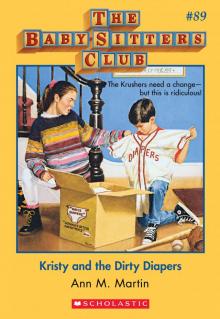 Kristy and the Dirty Diapers
Kristy and the Dirty Diapers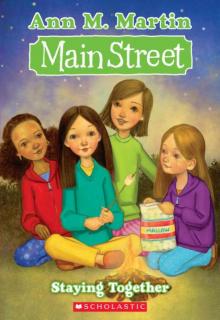 Staying Together
Staying Together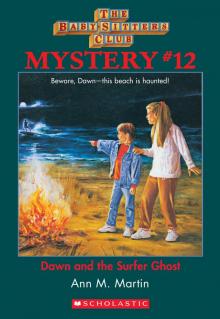 Dawn and the Surfer Ghost
Dawn and the Surfer Ghost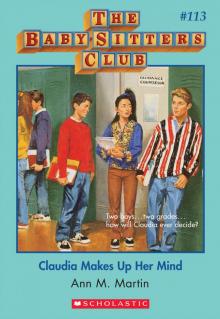 Claudia Makes Up Her Mind
Claudia Makes Up Her Mind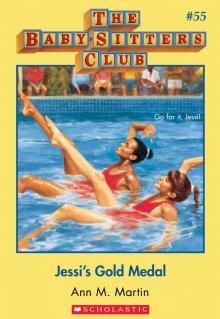 Jessi's Gold Medal
Jessi's Gold Medal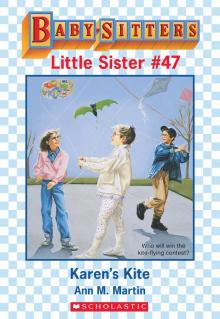 Karen's Kite
Karen's Kite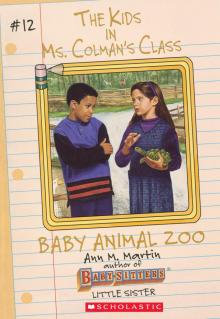 Baby Animal Zoo
Baby Animal Zoo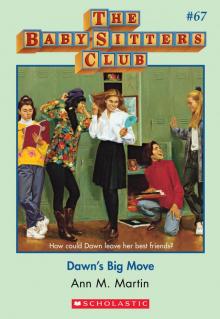 Dawn's Big Move
Dawn's Big Move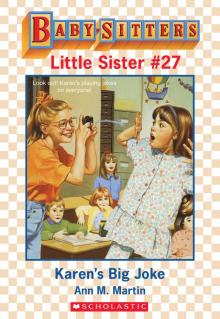 Karen's Big Joke
Karen's Big Joke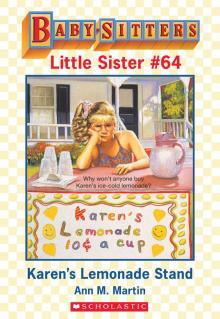 Karen's Lemonade Stand
Karen's Lemonade Stand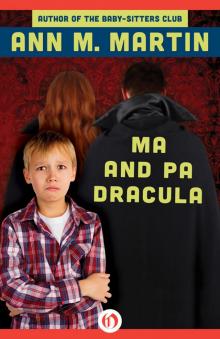 Ma and Pa Dracula
Ma and Pa Dracula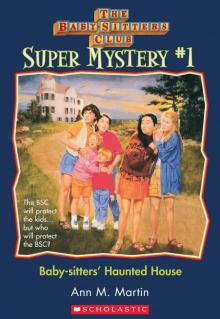 Baby-Sitters' Haunted House
Baby-Sitters' Haunted House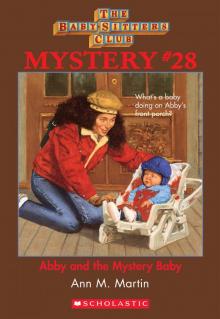 Abby and the Mystery Baby
Abby and the Mystery Baby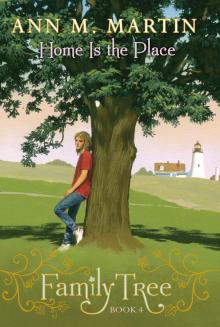 Home Is the Place
Home Is the Place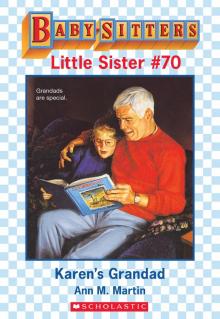 Karen's Grandad
Karen's Grandad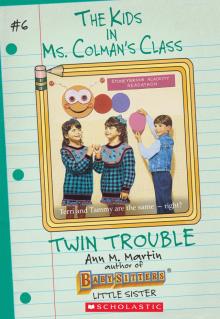 Twin Trouble
Twin Trouble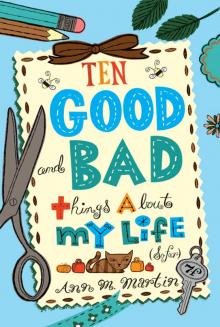 Ten Good and Bad Things About My Life (So Far)
Ten Good and Bad Things About My Life (So Far)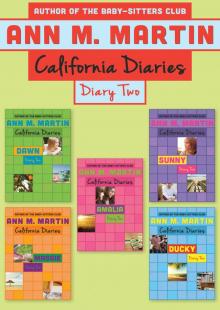 Diary Two
Diary Two Baby-Sitters Club 027
Baby-Sitters Club 027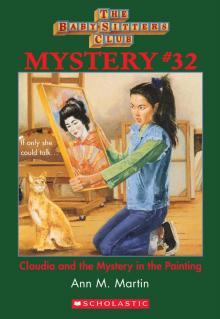 Claudia and the Mystery Painting
Claudia and the Mystery Painting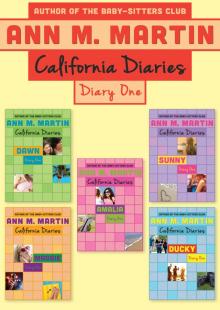 Diary One
Diary One Baby-Sitters Club 037
Baby-Sitters Club 037 Baby-Sitters Club 028
Baby-Sitters Club 028 Baby-Sitters Club 085
Baby-Sitters Club 085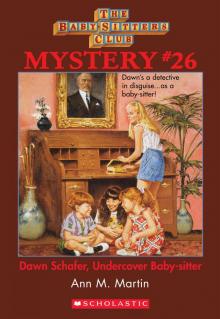 Dawn Schaffer Undercover Baby-Sitter
Dawn Schaffer Undercover Baby-Sitter Jessi's Babysitter
Jessi's Babysitter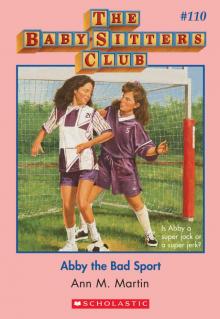 The Baby-Sitters Club #110: Abby the Bad Sport (Baby-Sitters Club, The)
The Baby-Sitters Club #110: Abby the Bad Sport (Baby-Sitters Club, The) Karen's Little Sister
Karen's Little Sister Baby-Sitters Club 058
Baby-Sitters Club 058 Claudia And The Genius On Elm St.
Claudia And The Genius On Elm St.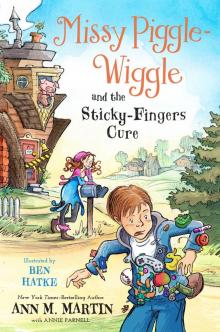 Missy Piggle-Wiggle and the Sticky-Fingers Cure
Missy Piggle-Wiggle and the Sticky-Fingers Cure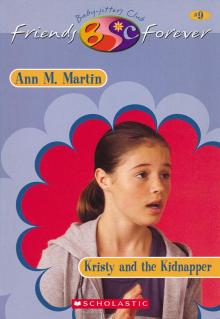 Kristy and Kidnapper
Kristy and Kidnapper Baby-Sitters Club 041
Baby-Sitters Club 041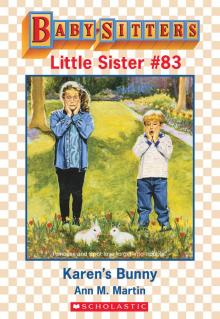 Karen's Bunny Trouble
Karen's Bunny Trouble Baby-Sitters Club 032
Baby-Sitters Club 032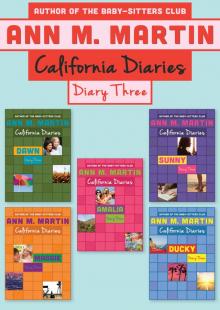 Diary Three
Diary Three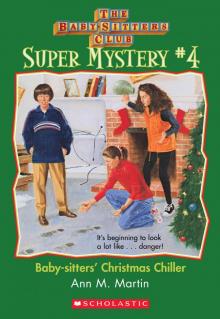 Christmas Chiller
Christmas Chiller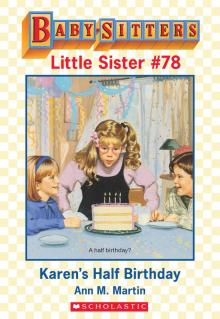 Karen's Half-Birthday
Karen's Half-Birthday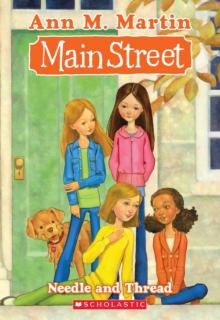 Needle and Thread
Needle and Thread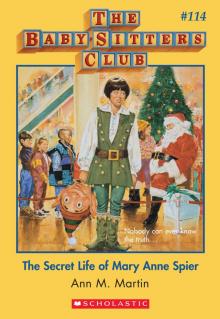 Secret Life of Mary Anne Spier
Secret Life of Mary Anne Spier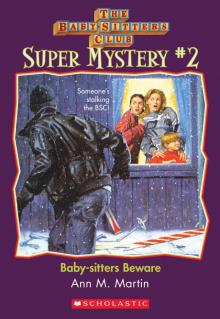 Baby-Sitters Beware
Baby-Sitters Beware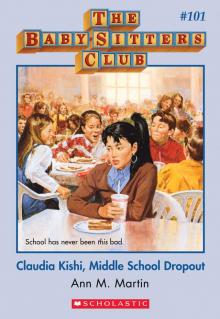 Claudia Kishi, Middle School Drop-Out
Claudia Kishi, Middle School Drop-Out Logan Likes Mary Anne !
Logan Likes Mary Anne ! Baby-Sitters Club 061
Baby-Sitters Club 061 Best Friends
Best Friends Baby-Sitters Club 031
Baby-Sitters Club 031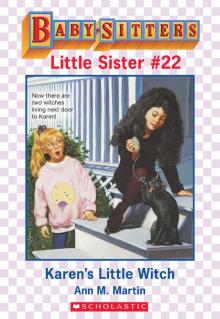 Karen's Little Witch
Karen's Little Witch Jessi Ramsey, Petsitter
Jessi Ramsey, Petsitter Baby-Sitters Club 123
Baby-Sitters Club 123 Baby-Sitters Club 059
Baby-Sitters Club 059 Baby-Sitters Club 033
Baby-Sitters Club 033 Baby-Sitters Club 060
Baby-Sitters Club 060 Baby-Sitters Club 094
Baby-Sitters Club 094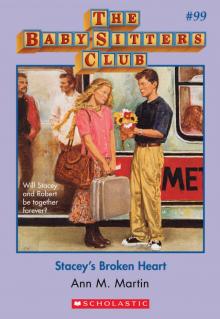 The Baby-Sitters Club #99: Stacey's Broken Heart
The Baby-Sitters Club #99: Stacey's Broken Heart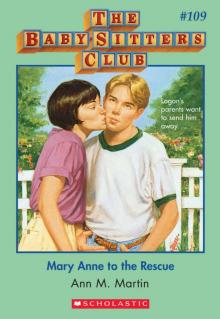 The Baby-Sitters Club #109: Mary Anne to the Rescue (Baby-Sitters Club, The)
The Baby-Sitters Club #109: Mary Anne to the Rescue (Baby-Sitters Club, The) Mystery At Claudia's House
Mystery At Claudia's House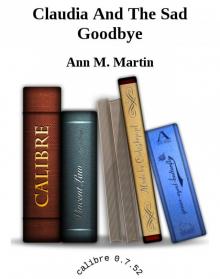 Claudia And The Sad Goodbye
Claudia And The Sad Goodbye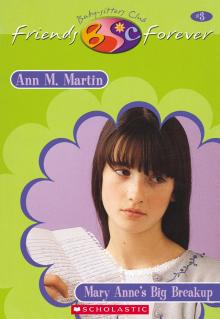 Mary Anne's Big Break-Up
Mary Anne's Big Break-Up Baby-Sitters Club 025
Baby-Sitters Club 025 Baby-Sitters Club 042
Baby-Sitters Club 042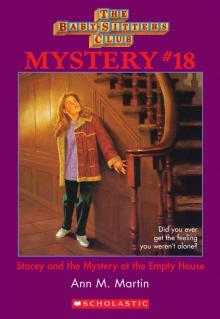 Stacey and the Mystery of the Empty House
Stacey and the Mystery of the Empty House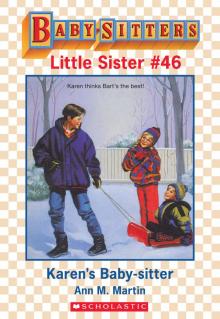 Karen's Baby-Sitter
Karen's Baby-Sitter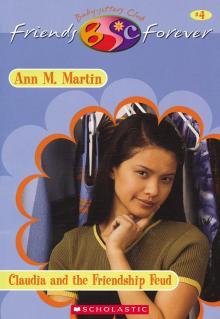 Claudia's Friendship Feud
Claudia's Friendship Feud Baby-Sitters Club 090
Baby-Sitters Club 090 Baby-Sitters Club 021
Baby-Sitters Club 021 Baby-Sitters Club 056
Baby-Sitters Club 056 Baby-Sitters Club 040
Baby-Sitters Club 040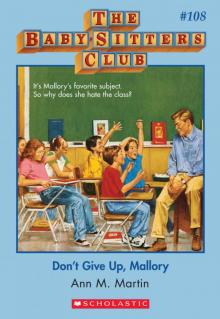 The Baby-Sitters Club #108: Don't Give Up, Mallory (Baby-Sitters Club, The)
The Baby-Sitters Club #108: Don't Give Up, Mallory (Baby-Sitters Club, The)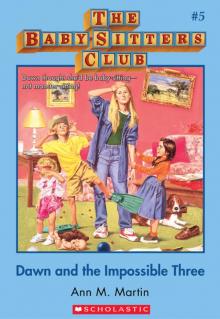 Dawn and the Impossible Three
Dawn and the Impossible Three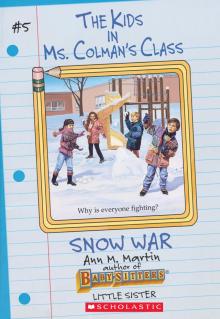 The Snow War
The Snow War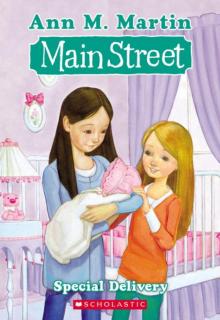 Special Delivery
Special Delivery Baby-Sitters Club 057
Baby-Sitters Club 057 Mary Anne And Too Many Babies
Mary Anne And Too Many Babies Baby-Sitters Club 030
Baby-Sitters Club 030